


































Bamike “Bambam” Olawunmi-Adenibuyan rose to prominence after her time at the Big Brother house. She has proven that reality TV fame can be the stepping stone to a vibrant career. Her name resonates among the entertainment and beauty landscapes, and since her time on reality TV, she has evolved into a multi-talented personality. While Bambam tapped into her creativity to build a presence in Nollywood, she has also ventured into the skincare and wellness industry as a brand ambassador. This wife and mother symbolises the modern woman who balances career ambitions with family life. She recently starred in a new hit YouTube movie, Love in Every Word, and she says being in this movie is her most significant turning point— people are now willing to pay a premium for her talent.
You can read her interview on pages 8 through 10, where she talks about her career, being a mum, and being a wife.
How can you tell if an oil or water-based skincare product is right for you? While both offer unique advantages, the secret to healthy, radiant skin is knowing which works best for your skin type. We reveal this secret on page 12.
We encounter people from different backgrounds in a work environment, so knowing and eventually trusting them is key to a conducive workplace. On page 14, we highlight ways to establish trust among colleagues and team members.
I wouldn’t call myself a Jason Statham fan, but I watch his movies when they are released and follow him on Instagram. Does this count as being a fan? I’ll let you answer that question.
This week, we reviewed his movie, A Working Man. Although our correspondent didn’t score it high, I’m still looking forward to seeing it. Until next week, enjoy your read.









SUNDAY, APRIL 06, 2025
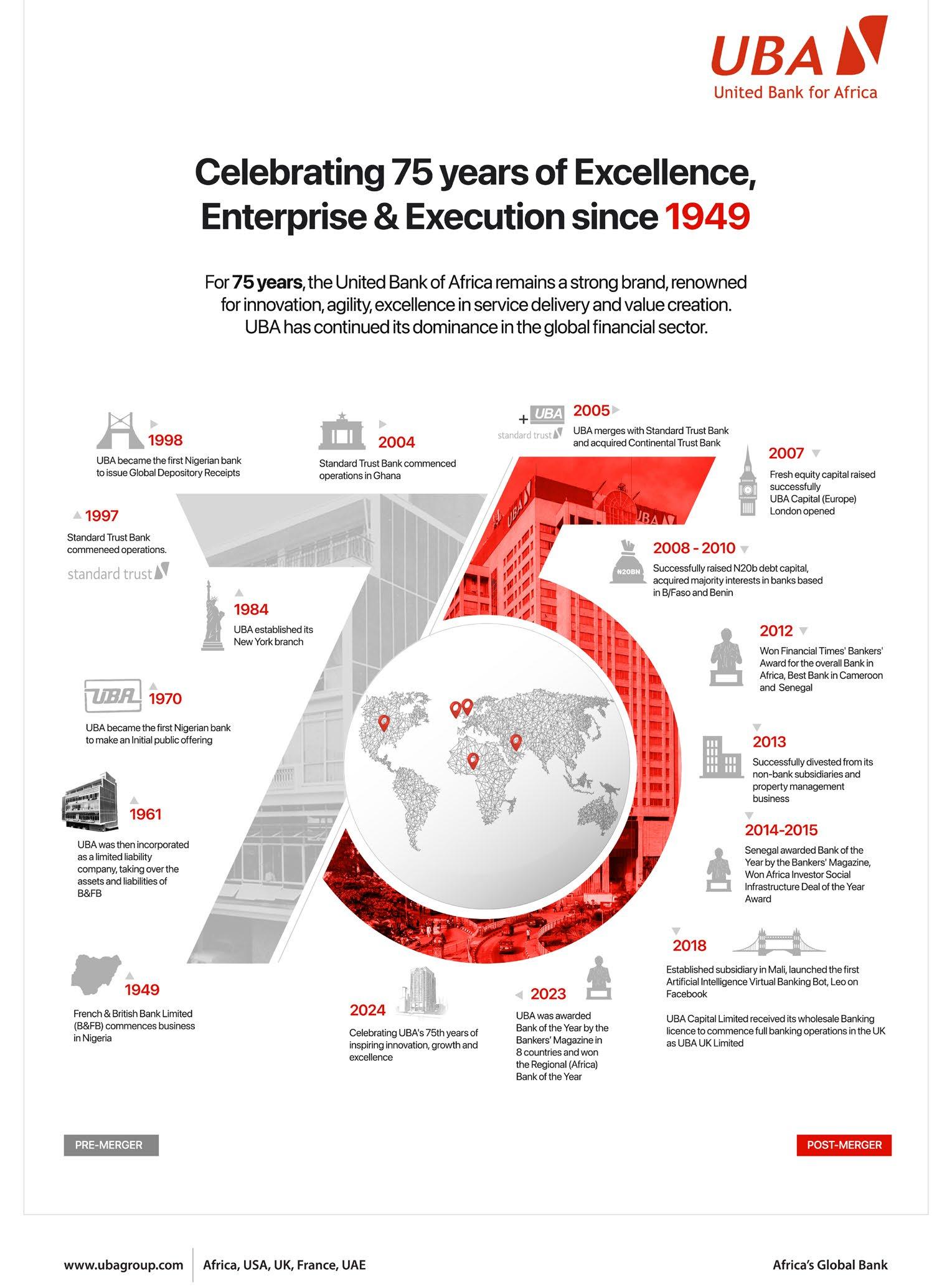


BY AMOS ESELE WITH KAJO MARTINS
After paying a condolence visit to Kano State last week, Governor Monday Okpebholo of Edo State and his Kano counterpart, Abba Yusuf, jointly condemned calls for reprisals for the 16 hunters from the state who were alleged to be violent kidnappers and killed by a vigilante group in Uromi, Edo State, a fortnight ago.
But indigenes of the Uromi community where the sad incident occurred have either fled or are keeping vigil, THEWILL has learnt, even after the police arrested some members of the indicted vigilante, transferred them to its national headquarters in Abuja and maintained sentry there. The reason is that the locals fear and believe a reprisal attack is coming. The date for the attack is reportedly scheduled for April 7, 2025.
THEWILL investigation shows that stakeholders from traditional rulers to politicians and community leaders are meeting round the clock to ensure the governor’s appeal holds and the newly deployed Police Commissioner to the state in the wake of the killings, Monday Agbonika, gets the necessary cooperation.
Even so, tension in the Uromi community is mounting by the day. Just like it did in Bokkos in embattled Plateau State for one week after the bandits had warned locals that they were coming after the Salah celebration.
“In Bokkos Local Government Area of Plateau State last week, the kidnappers warned they would come after Salah. And the communities prepared for them, but they did not know that the bandits would come in the afternoon. They started the attack in the afternoon, at 2pm,” Spokesperson of the Middle Belt Forum, Luka Binniyat told THEWILL on Friday. “If the bandits warn you they will be come. It is better to take the warning seriously and prepare for them. They may not come on the appointed day, but
they will surely come.”
As of the time going to press, 60 persons had been declared dead with 40 bodies recovered in the Bokkos LGA attack. This attack was similar to the one that led to the death of 10 persons in Ruwi village, in the same local government area, on March 27, 2025, while 10 others were killed on April 2, 2025, in a coordinated attack across several communities, including Mangor Tamiso, Daffo, Manguna, Hurti and Tadai.
Meanwhile, troops of Operation SAFE HAVEN (OPSH), responsible for maintaining peace in Plateau State, reported that they successfully foiled attacks by armed groups on several communities in Bokkos LGA.
Major Samson Zakhom, spokesman of Operation SAFE HAVEN, OPSH, said the bandits that attacked Tamiso, Daffo, Manguna, Tadai, and Hurti in Bokkos LGA were eventually overpowered by the troops, adding that the attackers were forced to abandon key items, including an AK-47 rifle and six motorcycles. “Operations will continue as part of ongoing efforts to safeguard communities in Plateau State,” he further said.
Similarly, in the same week, gunmen hijacked a packed Benue Links transportation company bus, murdered the driver and abducted all passengers on board in Ikobi area of Otukpo Local Government Area of Benue State, where hundreds of youths had protested against sustained banditry and kidnaping, shouting “Enough is Enough,” the previous week.
The victims were rescued by the police at the weekend. Police Public Relation Officer, ACP Sewuese Anene said that unfortunately, the kidnappers had inflicted machete cuts on two of the victims before their rescue.
In his reaction to the latest attack, the president of Ochetoha K’Idoma youth wing, Mike Magaji, decried what he referred to as the inaction of the Benue State Government over the killings
in the state.
He said Governor Hycienth Alia did not make any meaningful speech during his visit to Otukpo last Thursday to address protesting youths over serial criminal herdsmen attacks. He said, “It is heartbreaking that our people continue to live in fear while the government remains silent. How many more lives must be lost before decisive action is taken?
“The governor’s visit to Otukpo was a disappointment. Our people expected leadership, not vague reassurances. We need a clear plan to end these attacks.
“The state government must rise up to its responsibilities. We cannot continue to mourn our people daily while those in power look the other way,” the youths’ leader said.
A Catholic priest, Rev. Fr Raymond Imoter Iorvor lamented the wanton killing of people by marauding herdsmen for over 14 years in some areas. He said: “We voted for Governor Alia in 2023, and we will not stop supporting him in 2027, but if we are all dead who will he rule? We do not need palliatives from government but to send herders out of our communities for peace to reign.”
In an assessment visit to some protesting communities last week, the governor charged the citizens to refrain from taking the law into their hands, promising to channel their complaints to the appropriate quarters for redress.
Also, in Sokoto, the most wanted bandit in Nigeria, Bello Turji, declared wanted dead or alive a month ago by the Chief of Army Staff, Lt Gen Olufemi Oluyede, marked his Salah with the abduction of 11 victims.
Places like Ebonyi State in the South-East geo-political area of the country and Delta State in the South-South have come under increasing criminal herdsmen attacks recently. In Osun State, militias of feuding neighbouring communities of Ilobu and Erin-





Osun engaged in a bloody fight over land dispute, leading to the displacement of people, destruction of property until Governor Ademola Adeleke imposed a 24- hour curfew and ordered the security forces in the state to summon the traditional rulers of both towns to sign a peace agreement, while food and relief materials distribution got underway. However, the Chairman of Northern Governors Forum and Governor of Gombe State, Yahaya Inuwa, has stated that there is no tension in the North over the unfortunate incident in Edo State.
He issued a statement to call for calm and restraint, adding that state governors in the region were meeting with stakeholders in a bid to douse tension and promote peace and harmony among Nigerians.
UROMI
Binniyat said that while the Middle Belt Forum, MBF, composed of Southern Kaduna, Southern Kebbi, Southern Bauchi, Adamawa, Gombe and Taraba states, as well as the entire North Central geopolitical zone, including the Federal Capital Territory (FCT), supports the ongoing investigation to identify those responsible for the Uromi killings and take them to justice, they cannot ignore the stark reality that Middle Belt communities have suffered relentless attacks from armed herdsmen, with no commensurate response from the government.
“We hope that the swift response to the Uromi incident will set a precedent for a decisive crackdown on these criminals, the liberation of our abducted people and the reclamation of occupied territories,” Binninyat added.
Mr Sam Apologun, Executive Director of Open Society and Justice Reform, commended what the pro-active move by President Bola Ahmed Tinubu who directed security agencies to bring the perpetrators to justice, as well as Governor Okpebholo’s condolence visit to the bereaved families in Kano, in the company of his Kano counterpart, Governor Yusuf, coupled with cooperation with the police to arrest the identified culprits as promised. Akpologun claims the police authorities have also moved to douse tensions in Uromi and the entire Edo State where communities have been at the mercy of local and foreign kidnappers, particularly herdsmen, in recent times.
“One of the best proactive measures taken by the police authorities on this matter is the redeployment of CP Agbonika to the state,” Mr Akologu told THEWILL on Friday. He said he had known Mr Agbonika since 2011 when the new CP was a divisional police officer in Isokoko police station in the Agege area of Lagos State. “One thing that he is known for is his ability to pull communities together and leverage their collective strength to combat crime.
“Everywhere he headed there was massive reduction in crime, not because the police suddenly became supermen, but because they were able to harness the strength of communities. One thing I have noticed about the police is that without the cooperation of members of the community, they cannot effectively police the community.
“That is one area Agbonika is an expert. Secondly, he is a decisive person whose presence will significantly checkmate any tendency to corruption. Apart from that, Agbonika is an indigene of Edo State. So, I think the Police Service Commission has killed two birds with one stone by deploying a seasoned police officer who is also from the state. This will help to pacify the people. If Agbonika is able to harness the ability of the communities undergoing reported cases of kidnapping and herdsmen attacks, things would improve greatly,” he said.
A security intelligence analyst and Managing Director of G4S, Joshua Ogunmola, said security agencies cannot give the desired results if communities ignore threat indicators in their enclave and fail to assist the police with information. Arguing that since the ratio of the police to the population is very low and the civil authorities do not often allow the security agencies to work without undue interference, the general lack of cooperation by communities in terms of information sharing, has made it impossible to tame insecurity in the country.
Speaking to THEWILL on Friday night, Ogunmola, said, “You at times hear the phrase, “My hands are tied,” by security personnel, which is a way of saying they are not allowed to bring their experience to deal with a situation. “Strangers enter a community at will and nobody is paying attention. In fact, many communities harbor sympathisers of bandits and kidnappers, who they prefer to share information with rather than with the security personnel. Criminals know these security and communal shortcomings and exploit them to their advantage.”
Malam Yaya Zaki, a top official who conducted research for an Abuja-based Non-Governmental Organisation, Search for Common Ground, some years ago, told this newspaper at the weekend that the current situation in the middle belt is slightly different from what it used to be.
For eight years, he said, the NGO conducted the research on Fulani pastoralists and herders’ conflict in nine local governments in 36 communities, covering over 10 million persons in Nasarawa, Plateau and Kaduna States.
and investigations are ongoing to identify any security personnel involved in facilitating these illegal activities,” he added. POLITICS OF 2027 FUELING THE CRISIS?
Ogunmola argues that as a security intelligence analyst, politics should be downplayed in this matter and “our inability to deal with issues of insecurity,” should be the focus,” adding that he is yet to be privy to any information to justify any such claim.

“At that time, Benue had not exploded as it is now. The resurgence of the problem is no longer a farmer/ header conflict as we dealt with a long time ago. What is happening now is an organised cartel of criminals and bandits funded by oligarchs. The people who claim to be herders cannot, with AK47 rifles, kill villagers and occupy their communities. These ones come to mine solid minerals; it is a solid minerals war that is going on in many communities in the North central geo-political zone, even in Benue. They do not come with cattle. They displace the communities and bring artisans to start mining solid minerals for them.
“The videos that surface online to show herdsmen feeding crops to their cattle is the old narrative. No herdsman would bring their cattle to graze in a community they have attacked and not expect a revenge attack that would wipe out their cattle. Some farmer/ herder conflicts do happen as skirmishes, but that is not the fundamentals now. It is a mineral war. The metrics have changed, the old narrative is a camouflage. This is the dry season, so what are the things the cattle are going to eat? The rains have not started. Kidnapping is even a scam. Yes, the inter-communal crisis is still part of it. That is why I think the Uromi, Edo State case should be properly investigated.” Corroborating this mineral war analysis in the middle belt region, the Ministry of Solid Minerals Development said it made a shocking discovery in Nasarawa State last Thursday.
There, Mining Marshals successfully dismantled a heavily fortified illegal mining site in Rafin Gabas, Kokona Local Government Area of Nasarawa State. According to a statement made available to THEWILL, the site had long evaded law enforcement as it was protected by compromised security personnel.
However, following a strategic and well-coordinated operation, the Mining Marshals penetrated the stronghold, leading to the arrest of three foreign nationals involved in the nefarious activities. Several other suspects managed to flee, allegedly with the help of security operatives.
The Minister of Solid Minerals Development, Dr. Dele Alake, commended the operation, calling it a major breakthrough in the Federal Government’s ongoing fight against illegal mining.
“This is a crucial milestone in our tireless efforts to sanitise the mining sector. We are committed to cracking down on illegal mining operations and ensuring that those responsible are held accountable,” Alake stated. ACC. John Attah Onoja, Commander of the Mining Marshals, confirmed that the site had been sealed off following the raid.
“A manhunt is currently underway for the suspects who escaped,
“ There is a need to make Nigerian citizens the first layer of defence against attacks by bandits and insurgents because there is no way a security agency would muster the resources to guard every inch of a nation’s land mass
But MBF’s Binninyat says there is politics, but in a broader sense. Terrorist groups like Boko Haram, Islamic State for West Africa, ISWAP and Ansaru destabilising communities in parts of the North-East and North-West regions are political.
He said, “The MBF believes that the current form of banditry, kidnapping has nothing to do with the nearest future but a longterm plan to destabilise the middle belt and transplant it with a Fulani population. Former President Muhammadu Buhari’s RUGA policies was designed to create Fulani settlements all over local governments in Nigeria. Apparently that policy failed. But it does not seem as if RUGA is dead because if you look at the creation of the Ministry of Livestock, it is still the same voice of RUGA. The government says they are going to have ranching enclaves that will bring some value chain to agriculture. That is fine. However, we in the Middle Belt are not going to accept exclusive ranches for the Fulani in our communities.”
Both Akpologun and Binniyat, separately allude to the suggestion by the Director- General of the Department of State Services, DSS, Mr Adeola Ajayi, as the best recommendations to end terrorism, banditry and kidnapping in the country.
“We thank God the DG of DSS has come out to emphasise on how to arrest banditry, kidnapping and terrorism. This terrorism can be solved in one month if the Federal Government says, for instance, that every community brings out 10,000 able bodied men and they give them basic training on weapons handling,” Binniyat said. Using Kaduna State as an example, he explained that despite Governor Uba Sani’s offer of amnesty to bandits with a promise to re-integrate them into the community, nothing significant has changed.
He agreed that things have relatively improved in some parts of Southern Kaduna such as Birnin Gwari, but insisted that killings and kidnapping are still going on in the area.
“In fact, kidnapping in Southern Kaduna is at an all-time high. I am on ground here and I am speaking with authority. I have even published some stories on it. What has changed here is that the invasion of communities, burning them down and killing people has reduced. But daily, isolated killing and mass kidnapping is at its peak now in Kajuru Local Government, part of Chikum and Kachia Local Government Areas. We have over 1,000 persons from Southern Kaduna that are in kidnappers camp right now with over 100, 0000, persons in Internally Displaced Persons Camps, IDP. The kidnappers charge about N10 million for the release of each person. They have killed our people and impoverished us.
The Chief of Army Staff, Lt Gen Christopher Musa has been doing his best, trying to get Army Forward Base operations in the state. So, what the kidnappers do is to come in daylight, point their guns at the people and kidnap them.”
As a keynote speaker at the maiden meeting of the Alumni Association of the National Institute of Security Studies (AANISS) in Abuja on February, 2025, Mr. Ajayi, suggested, “There is a need to make Nigerian citizens the first layer of defence against attacks by bandits and insurgents because there is no way a security agency would muster the resources to guard every inch of a nation’s land mass.”
He narrated his experience while serving as Bauchi State Director of the DSS to back up his submissions on what he called the practical approach towards curbing terrorism.
According to him, the Azare community in Bauchi State and Tafawa Balewa, another area of the same state, were determined to confront and eradicate a group of Boko Haram terrorists from their communities and succeeded.
He said, “What I am trying to say is that the practical approach to mobilising people is that you have to get everyone involved. You did not expect the Nigerian Army, Police, DSS to protect every Nigerian or every community. It is not going to work. In the US, if you visit someone in his house, you will be shocked that when the guy hears a police siren, he will just pull out his drawer, pull out his gun and keep it.”

L-R: Vice-President Kashim Shettima being welcome by Minister of State for Foreign Affairs, Ambassador Bianca Odumegwu Ojukwu to Dakar, Senegal for the country’s 65th Independent Anniversary celebration on April 3, 2025.
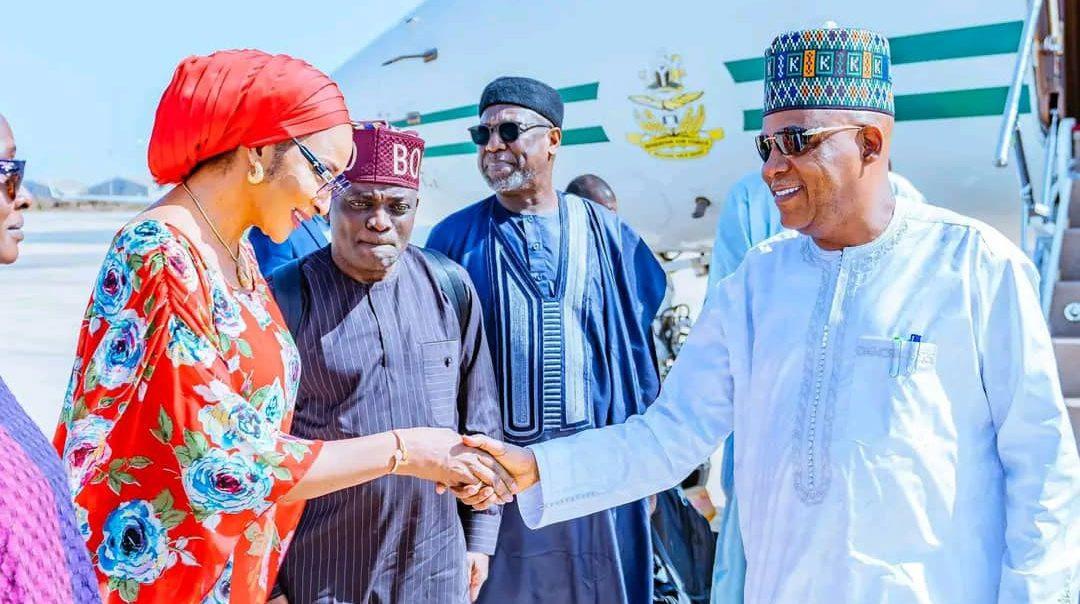
BY SUNDAY OGBU
The Coordinator of Ivo Development Centre in Ebonyi State, Honourable Aja Donatus Ikenna, has expressed commitment to ensuring the security of lives and properties of the people, following heightened insecurity in his domain.
Honourable Ikenna disclosed this in an interview with journalists in Abakaliki while speaking on the spate of herdsmen attacks, communal crisis and activities of hoodlums in Ivo DC.
According to him, the security of his people was his priority, but he stated that his administration had spent a huge amount of funds to sustain security. He acknowledged the governor of Ebonyi State, Francis Nwifuru, for allowing him and other coordinators to serve and take care of the people.
“Before being the coordinator, I already had a cordial relationship with my people. As God may have it, through our workaholic and amiable governor, Rt. Hon. Prince Nwifuru Ogbonna Francis made us what we are today and made us proud before our people by allowing us to see the funds we use to take care of our people.
“There are many ways of taking care of people. It is not only through financial assistance but through your behaviour. Financial aid is so essential in that it is through this means that we assist people.
“As a public office holder, people will always approach you for help. I know I have been assisting my people financially, and with this gesture, the second tenure of the governor is reassured. I am there for him.
“The life-touching projects we are doing in my development centre
are facilitated by the governor. We must make the people believe that whatever we are doing is enabled by the governor, and that is why his second tenure is sacrosanct. Everybody will vote for him.
“I have done a lot of infrastructural work in my development centre. I did perimeter fencing to guarantee security, I renovated the staff quarters and my office. I have done grading and lateriting. Even as I speak to you, grading work is ongoing. I have more than fifty people I pay monthly. The list is there.
“I am following the governor’s policy of the People’s Charter of Needs. Whenever we have an allocation, the money is used judiciously. In a nutshell, I am from a development centre where there is a serious security challenge. As I speak to you now, I am in serious indebtedness because of the security challenge in my development centre.
“Are you aware that Fulani herdsmen have been attacking my development centre? Even today, they attacked the development centre. It happens almost every day. My management committee was attacked last week in his house. His cars were burnt, and his phones and other belongings were taken away.
“This security challenge started when I assumed office. I am from the village that is having problems with Akaeze village. The crisis started in February last year to date. I cannot fold my arms while my people are dying. In this area, where there are security challenges, the leaders are the target. Security alone is very expensive. You need to borrow to address insecurity”, he said.
AFederal High Court in Bayelsa State, sitting in Yenagoa, issued an order restraining associates of the Federal Capital Territory Minister, Chief Nyesom Wike, from holding a mega rally in the state pending the hearing and determination of the Motion on Notice. The proposed rally is scheduled for Yenagoa, the Bayelsa State capital, on April 12, 2025.
Police, Bayelsa State Police Command.
BY FELIX IFIJEH
Dr. Hakeem Baba-Ahmed, the Special Adviser on Political Matters in the Office of the Vice President, has reportedly resigned from his position.
Baba-Ahmed, a former spokesman for the Northern Elders Forum, was said to have tendered his resignation letter about two weeks ago, according to a report by *Daily Trust*.
As of the time of filing this report, the Presidency had yet to officially confirm or acknowledge the development. Appointed in September 2023, Baba-Ahmed played a visible role in the Tinubu administration, particularly in representing the Presidency at public functions.
While the reason for his resignation remains unclear, his stint in office was not without controversy. One of the most prominent was his public spat with the Minister of State for Defence, Bello Mohammed Matawalle, over comments made about the Northern Elders Forum.
Matawalle had dismissed the NEF as a “political paperweight” after the group claimed that the North erred in voting for Tinubu during the 2023 general election.
Reacting to the Minister’s statement, Baba-Ahmed had said, “Scathing criticism of NEF by the junior minister of defence, Matawalle, is ill-advised. He could have done a better job for this administration if he identified contributions of especially northern ministers and other appointees like me to improving security and reducing poverty in the North.”
Hon. Justice I. A Uzakah granted the Motion Ex-Parte in Suit No. BYHC/YHC/CV/133/2025 filed by the state’s Attorney General, Mr Biriyai Dambo SAN. Listed as first and second defendants/ respondents in the suit are the lead convener of the NEW Associates, organisers of the rally, Mr George Turnah, and the FCT Minister, Wike. The other defendants are the Nigeria Police Force, the Inspector-General of Police and the Commissioner of
The enrolled court order states that: “An order of the interim injunction is hereby made or granted restraining the 1st and 2nd Defendants, whether by themselves, their agents, associates, privies, representatives (or any person whatsoever acting at their behest), from conducting, convening, coordinating, engaging in, organising, participating in, holding, hosting, or facilitating any political assembly, rally meeting, or gathering within Bayelsa State, for the purpose of solidarity, hosting, and celebrating the 2nd Defendant in Bayelsa State, pending the hearing and determination of the Motion on Notice for Interlocutory Injunction.”
The matter was adjourned until April 11, 2025, for a hearing.
Matawalle had earlier fired back, saying, “Dr. BabaAhmed’s relationship and affinity with the Northern Elders Forum (NEF) is well known. As an appointee of this administration, it is his responsibility to work for its success and protect the government against unjust and vicious attacks from those who hide under ethnic and other primordial interests to heat up the polity for myopic reasons.”
The disagreement drew public attention and sparked debate over the loyalty of presidential appointees with strong ties to socio-political interest groups.
Baba-Ahmed, an elder brother to Labour Party’s vicepresidential candidate in the 2023 election, Yusuf Datti Baba-Ahmed, has yet to make any official statement regarding his reported resignation.





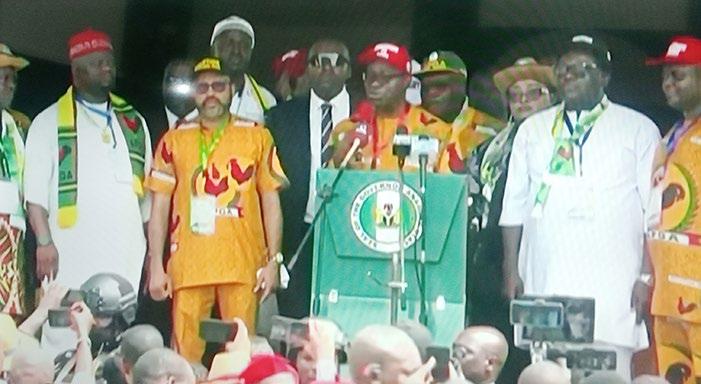
BY FELIX IFIJEH
Vice Admiral (Rtd) Ibok-Ete Ekwe Ibas has appealed for collaboration and cooperation of the National Assembly in securing federal support for Rivers State infrastructural projects.
The Rivers Administrator made the appeal on Friday when he received a courtesy visit, members of the Senate Committee on Works at the Government House in Port Harcourt. The Committee, led by its Chairman, Senator Barinada Mpigi, said they were in the State to carry out oversight on some ongoing federal projects.
Welcoming the lawmakers, Ibas said their presence signifies “the commitment of the National Assembly to the well-being of our state and its people, especially as we work towards addressing the insecurity as well as the infrastructure challenges that are critical to our development.
“As you embark on this oversight visit to assess the state of critical infrastructure, I will like to emphasise the significance of this engagement.
“Rivers State, the Treasure Base of the Nation and the key economic hub of the nation, is known for vital infrastructure, including roads, bridges, sea and airport, oil and gas facilities, petrochemical, refineries and other essential facilities.
“However, as in most states of the nation, we are faced with challenges in maintaining and expanding these infrastructure due to various factors, including but not limited to resource constraints.
“Since my resumption on the 20th of March, 2025, I prioritised the restoration of peace and stability in the state. Our efforts have been focused on creating a conducive environment for investment, development and prosperity.
“We have engaged in productive consultation with key stakeholders, such as civil society organisations, traditional rulers, Local Government Heads,
government officials and civil servants to restore the trust and stability needed for sustainable progress.
“That being said, we recognise the restoration and development of infrastructure as foundational to achieving lasting peace, economic growth and prosperity.
“I respectfully request the cooperation of your esteemed committee in securing the necessary federal support for our state infrastructural projects. You have listed most of the projects that are ongoing presently. These include both financial backing and the facilitation of speedy execution of federal projects that will contribute to our state’s growth.
“Your continued advocacy within the National Assembly will be instrumental in ensuring that


Rivers State receives the attention and resources needed to succeed.
“Relatedly, we are in the process of putting together a new budget that reflects our commitment to healthcare, education, social services and the continued infrastructural development of our state.
“We have worked diligently to ensure that this process is transparent, inclusive and most importantly expediting. The new budget, which is nearing finalisation, focuses on creating job opportunities and investing in key sectors such as agriculture, infrastructure and technology.
“As we move forward with these initiatives, we need your continued support to help us secure necessary resources and legislative backing to bring them to fruition. Your partnership is critical to our success in ensuring that Rivers State remains on the path of progress and enduring peace for future generations.
“In conclusion, I believe that with your support and continued collaboration, we can transform Rivers State into a model of peace, prosperity and development. Together, we can overcome the challenges we face and create a future that is bright for all our people.”
The Shi’ites have vowed to institute legal action against the Federal Government of Nigeria and the Nigerian Army, unless their members, including over 60 minors, allegedly arrested and detained are not released.
The Islamic group made this known at the weekend while speaking with journalists in Abuja, on the recent alleged attack on their member.
THEWILL recalls that on March 28, 2025, members of the Islamic group while on a peaceful procession to mark the International Quds Day, allegedly came under attack by the officers of the Nigerian Army.
Speaking on the issue, a team of lawyers, led by Mr. Bala Dakum and Yushau Uthman Dakum claimed that about 26 persons were allegedly shot dead during the incident by the security officers.

“We are compelled to address you this evening due to the recent avoidable but unfortunate brutal attack on our clients (the Shiites Muslim faithfuls). Speaking further, Dakum alleged that the detainees were coerced into writing or signing statements at the police cell in the absence of their lawyers, contrary to the provisions of the Administration of Criminal Justice Act (ACJA), 2015.
The lawyers in addition claimed that some of the Shi’ites members arrested and detained were over 60 minors who have been kept in the same cell with persons suspected to have been involved in heinous crimes contrary to all norms and provisions of the ACJA 2015 and Child Rights Act. The lawyer also said that despite several appeals, the police are yet to release corpses of persons who were brutally killed by the soldiers.
L-R: Member, Lagos State House of Assembly, Hon. Kehinde Joseph; wife of newly sworn-in chairman of Ayobo-Ipaja (LCDA), Temitope Oluwaloni; her husband and Chairman of the council, Otunba Oladipupo Oluwaloni; Governor of Lagos State, Mr. Babajide Sanwo-Olu; his deputy, Dr. Obafemi Hamzat; Head of Service, Mr. Olabode Agoro and Commissioner for Local Government, Chieftaincy Affairs & Rural Development, Hon. Kayode Roberts, during the swearing in of Ayobo-Ipaja LCDA chairman, at the Lagos House, Ikeja on April 03, 2025.
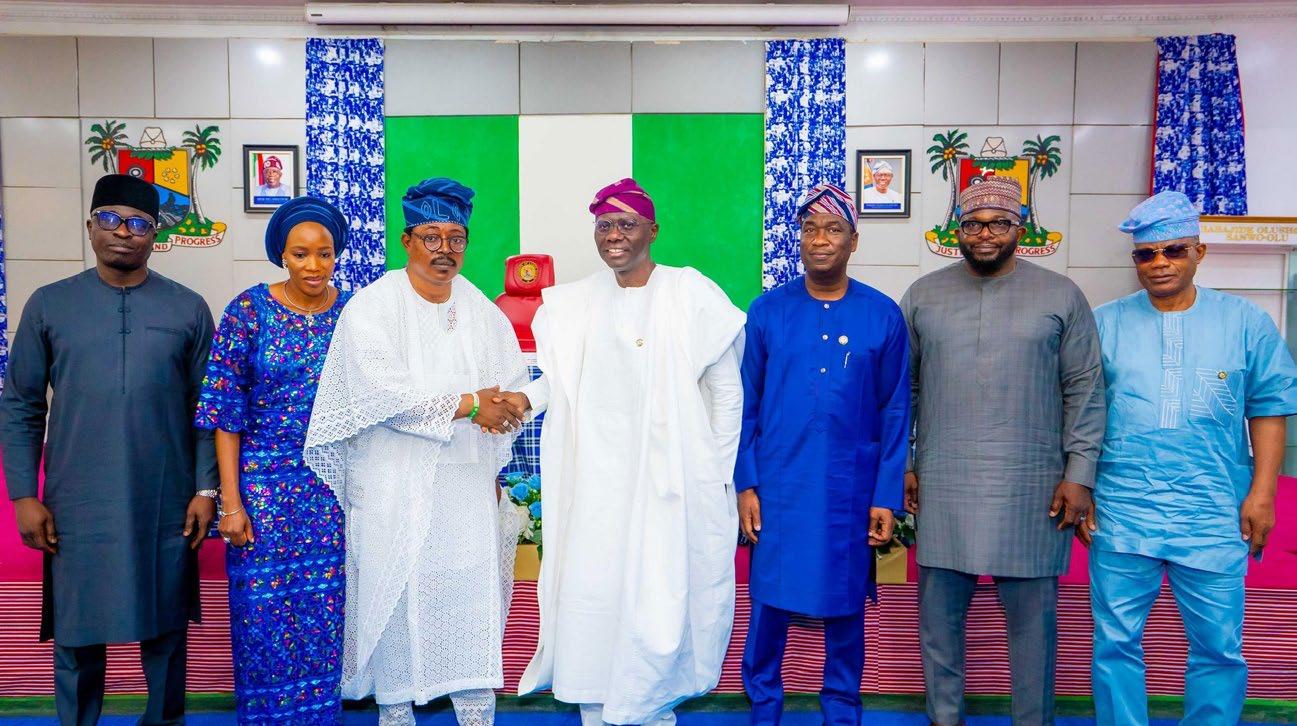
BY FELIX IFIJEH
The United States of America has expressed its concerns over a recent tribunal judgement affirming the victory of Monday Okpebholo of the All Progressives Congress (APC) in the September 21 governorship election in Edo State.
THEWILL reports that a three-member panel of the Governorship Election Petition Tribunal, chaired by Justice Wilfred Kpochi, on Wednesday, dismissed the three petitions, including that of the Peoples Democratic Party (PDP) and its candidate, Asue Ighodalo, the Accord Party and the Action Alliance (AA), for lacking merit.
The petitioners had alleged irregularities, including over-voting, lack of ballot serialisation, errors in collation, miscalculations in results and non-compliance with the provisions of the Electoral Act, 2022.
Reacting to the judgement in a statement issued through its Mission in Nigeria, the United States said it expressed shock that despite the electoral irregularities, the tribunal affirmed the election of Okpebholo as governor.
In a statement shared on the Embassy’s official X account, the United States pointed to “serious lapses in the collation process”
that have alarmed civil society groups and election observers alike.
Ambassador Mills reiterated his earlier statement on September 24, underlining the necessity of transparency and due process to maintain public confidence in democratic institutions. Reaffirming commitment to supporting free, fair, transparent, and credible elections in Nigeria, the United States said it would continue to closely monitor the situation of legal process in the Edo governorship election.
The statement reads: “The U.S. Mission in Nigeria is following the Edo election appeal process closely, particularly given civil society’s concerns about critical issues related to the election, such as ‘serious lapses in the collation process’ that were observed.
“[https://tinyurl.com/485xxzfk] Ambassador Mills reiterates his statement of September 24 that transparency and due process are crucial to maintaining public confidence in any democratic system. The United States reaffirms our commitment to supporting free, fair, transparent, and credible elections in Nigeria and will continue to monitor the situation closely.”
BY KAJO MARTINS, MAKURDI
Benue State Police Command rescued fourteen passengers kidnapped along the Makurdi-Otukpo road in a nearby forest on Friday night.
The Command said that at about 1500hrs, they sighted the bandits in the forest and engaged them in a gun duel, and the superior firepower of the police subdued the kidnappers, and they took to their heels, abandoning their captives.
Police Public Relations Officer, ACP Sewuese Anene, in a statement, said that, unfortunately, the kidnappers had inflicted machete cuts on two of the victims before their rescue. “Fourteen victims were rescued and taken to the hospital where one was confirmed dead and others are currently receiving treatment”, the statement said.
The PPRO quotes the Commissioner of Police, Benue State Command, CP Steve Yabanet, as commiserating with families of the three passengers who lost their lives in the incident and pledging his commitment to bringing perpetrators to book.
He enjoined the people of Otukpo to look out for suspects with gunshot injuries and report to the police, saying many of the bandits who fled received gunshot injuries during the exchange of fire.
THEWILL recalls that on April 3, 2025, a Toyota Hiace bus of Benue Links transport company was conveying passengers from Makurdi to Otukpo, and on reaching Oturkpo Burnt Bricks area, a gang of armed kidnappers shot sporadically at the driver and a passenger at the front seat, causing the driver to stop on the highway.
Upon receipt of this information, the police, in collaboration with members of the Benue State Civil Protection Guard, swiftly moved to the scene and found the driver and one passenger, who sustained gunshot injuries in the vehicle, while the kidnappers whisked away others.
The statement added that the injured were conveyed to the hospital, where they were confirmed dead by a doctor.
BY FELIX IFIJEH
The Federal High Court sitting in Abuja has barred all parties in the ongoing legal dispute between Senate President Godswill Akpabio and suspended Senator Natasha Akpoti-Uduaghan from speaking to the media or making public comments regarding the case.
Justice Binta Nyako, who is now presiding over the matter, issued the gag order on Friday following complaints by Akpabio’s counsel, Kehinde Ogunwumiju (SAN), who drew the court’s attention to a series of media interviews granted by Akpoti-Uduaghan concerning the litigation.
In a brief ruling, Justice Nyako directed that, “All parties and their lawyers are hereby restrained from granting any press interviews related to the subject matter of this suit.” She also prohibited the streaming of proceedings on social media, placing a tight lid on public commentary as the court considers the substance of the suit.
THEWILL recalls that tensions flared during Senate plenary on February 20 when a dispute over seating arrangements triggered a confrontation between Akpoti-Uduaghan and Senate President Akpabio. The Kogi Central Senator, who was visibly displeased over the relocation of her seat, later accused Akpabio of long-standing sexual harassment, alleging his hostility toward her stemmed from her refusal to entertain his advances.
Shortly afterward, Akpoti-Uduaghan was suspended from the Senate for six months following a recommendation by the Senate Committee on Ethics, Privileges and Public Petitions, which found her guilty of misconduct and violation of Senate rules.
She subsequently approached the court to stop the committee from initiating or continuing disciplinary proceedings against her. Justice Obiora Egwuatu initially granted an interim order halting the process on March 4, but later vacated the order on March 19 after Akpabio’s legal team questioned the court’s jurisdiction over legislative affairs.
Justice Egwuatu later recused himself from the case on March 25 after Akpabio raised concerns over his neutrality. The matter has since been reassigned to Justice Binta Nyako by the Chief Judge of the Federal High Court, Justice John Tsoho.



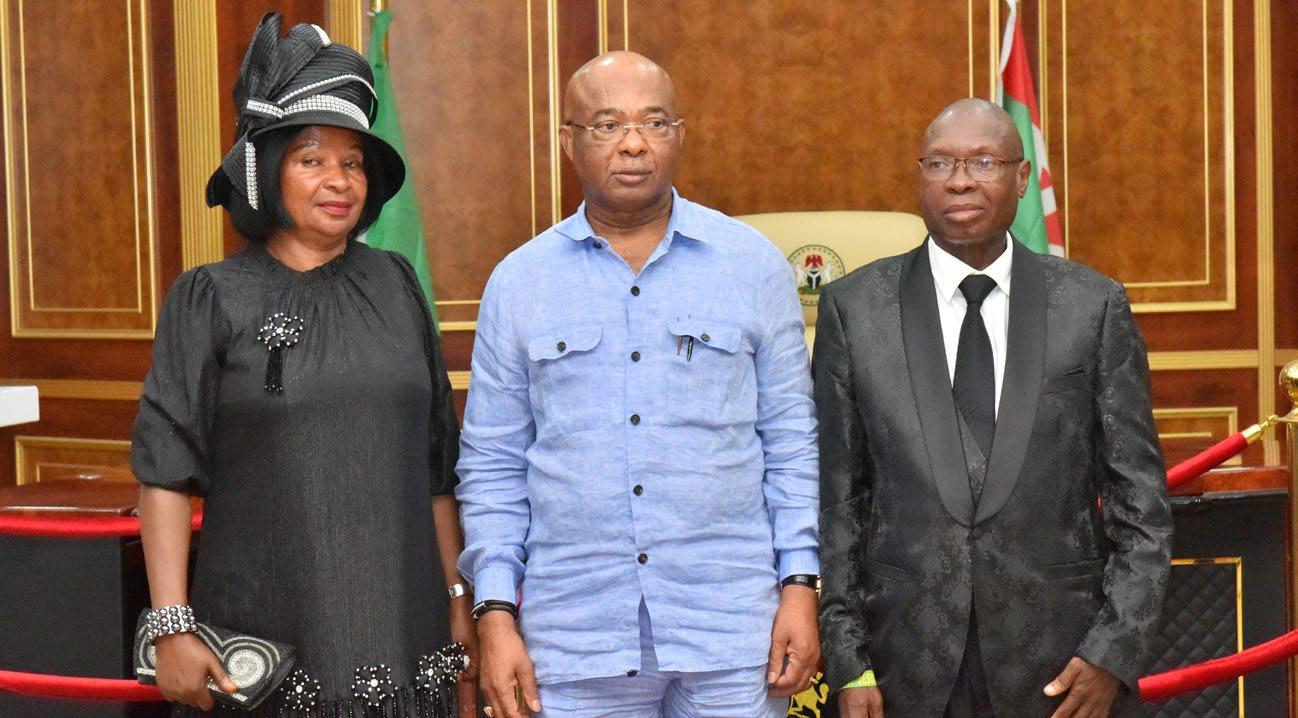
BY KAJO MARTINS, MAKURDI
Medical professionals in Makurdi have lauded the Federal Government’s approval for the establishment of an Infectious Diseases Control Centre in Vandeikya Local Government Area of Benue State, describing it as a timely intervention for the state’s healthcare sector.
Speaking in separate interviews, Surgeon Dr. Michael Mbanongun and Pharmacist Philip Anongu praised the initiative, noting that the facility would not only serve the people of Benue but also neighbouring states such as Cross River and Taraba.
Dr. Mbanongun expressed optimism that the centre, when completed, would mark a significant milestone in the development of the healthcare system in the state.
“The centre is expected to be equipped with modern facilities and adequate manpower, which have long been lacking in our existing institutions. It will go a long way in addressing the gap in medical attention, especially for infectious diseases,” he stated.
The medical practitioner commended Governor Hyacinth Alia for his foresight in prioritising the health needs of citizens, saying his proactive approach reflects
a responsive and responsible government.
In his remarks, Pharmacist Anongu of the Federal Medical Centre, Makurdi, described the proposed centre as a monumental project that underscores Governor Alia’s seriousness in addressing critical health challenges.
He decried the rising prevalence of infectious diseases in the state, blaming the trend on the absence of a quality control centre. He believes the new facility will not only save lives but also open up employment opportunities for healthcare workers.
“The centre will help curb the spread of infectious diseases and contribute significantly to job creation in the health sector,” Anongu noted.
He urged the Federal Government to expedite the implementation process and called on residents to support the Alia administration in its development drive.
“The governor is steadfast in his commitment to selfless service. Benue people must rally behind him to sustain the momentum,” he added.
EFCC Arraigns Sierra
for Non-declaration of $90,000 at MMI Airport
The Lagos Zonal Directorate 2 of the Economic and Financial Crimes Commission, EFCC, OkotieEboh, Ikoyi, Lagos, has arraigned a Sierra Leonean, Alhaji Ahmed Shaw, for non-declaration of the sum of $90,000 (Ninety Thousand United States Dollars) before Justice D.I.Dipeolu of the Federal High Court sitting in Ikoyi, Lagos.
The defendant was arrested on March 3, 2025 at the Murtala Muhammed International Airport, Ikeja, Lagos by operatives of the National Drug Law Enforcement Agency, NDLEA, for non-declaration of the sum of $90,000( Ninety Thousand United States of America Dollars).
Upon his arrest, the Agency had, on Friday, March 5, 2025, handed him over to the Lagos Zonal Directorate 2 of the EFCC, Okotie Eboh, Ikoyi, Lagos for further investigations.
Consequently, he was arraigned on Thursday, April 3, 2025 on a one-count charge bordering on alleged money laundering.
President Bola Tinubu has approved the appointment of Nasir Naeem Abdulsalam as the Managing Director of Ajaokuta Steel Company.
A statement by Segun Imohiosen, Director of Information and Public Relations in the Office of the Secretary to the Government of the Federation, said the appointment takes effect from 3rd April 2025.
“The appointment takes effect from 3rd April 2025 and is in accordance with the provisions of the Certain Political and Judicial Office Holders (Salaries and Allowances, etc) Act 2008 as amended”, he said
Until his appointment, Nasir served as the Technical
Adviser to the Honourable Minister of Steel Development, as well as the Special Assistant (Academics) to the Director General of the National Institute for Legislative and Democratic Studies (NILDS).
“President Tinubu tasks the appointee to leverage on his wealth of experience in the steel industry in his new assignment in revolutionising the company to generate important upstream and downstream industrial and economic activities that will position the nation as the industrial hub of Africa in line with the diversification drive of the Renewed Hope Agenda”, the statement added.


The count reads: “That you, ALHAJI AHMED SHAW, on the 3rd day of March, 2025 in Lagos , within the jurisdiction of this Honourable Court, failed to make a declaration of the sum of $90,000 (Ninety Thousand United States of America Dollars) to the Nigeria Customs Service at the Murtala Muhammed International Airport, keja, Lagos and you thereby committed an offence contrary to and punishable under Section 3(5) of the Money Laundering (Prohibition and Prevention) Act, 2022.”
The defendant pleaded not guilty to the charge when it was read to him.
In view of his plea, prosecution counsel, C.C. Okezie, asked for a trial date and for the defendant to be remanded at a Correctional Centre.
Justice Dipeolu adjourned till April 15, 2025 for commencement of trial and also ordered the remand of the defendant at a Correctional Centre.

BY FELXI IFIJEH
The Senator representing Kogi Central at the National Assembly, Natasha Akpoti-Uduaghan, has had the last laugh, while her traducers pushing for her recall by hook or crook must be wailing.
THEWILL checks show the ambiguous nature surrounding the process has alerted the Independent National Electoral Commission to a futile exercise. For one, the logistics and monetary implications as well as the likely political backlash has made the Commission take a closer look at the whole exercise that was mired in high wired politics.
Widely reported as hurriedly sponsored and put up by her home government with the active support of her feuding colleagues at the Senate, the recall process fell short of the constitutional requirement regarding signatures and thumbprints, address and location.
Thus, the Independent National Electoral Commission on Thursday declared that the petition seeking the recall of Senator Natasha Akpoti-Uduaghan, representing Kogi Central, has failed to meet constitutional requirements. Natasha Akpoti-Uduaghan, thus survived plans to recall her from the National Assembly.
THEWILL recalls that some registered voters from the Kogi Central Senatorial District, led by the Chairperson of the Kogi Women Development Association, Omole Charity Ijese, submitted a petition to INEC on March 24 to recall Natasha from the National Assembly.
According to INEC, “The petition was accompanied by six bags of documents said to be signatures collected from over half of the 474,554 registered voters spread across 902 Polling Units in 57 Registration Areas (Wards) in the five Local Government Areas of Adavi, Ajaokuta, Ogori/ Magongo, Okehi and Okene.” Sam Olumekun, INEC National Commissioner and Chairman of Information and Voter Education Committee, the committee provided an update.
He said the petition failed to meet constitutional requirements enshrined in Section 69(a) of the Constitution of the Federal Republic of Nigeria 1999 (as amended), which requires the signatures of more than half of the registered voters in the constituency. The Commission estimated the total number of registered voters in the Kogi Central Senatorial District at 474,554. However, more than half of this figure (i.e., 50 percent+1) is 237,277+1, which means that at least 237,278 voters are needed to sign Natasha’s recall.
Olumekun explained that across the 902 Polling Units in 57 Registration Areas and five Local Government Areas that make up the Senatorial District, the Commission ascertained 208,132 signatures/thumbprints from the submission made by the petitioners. This translates to 43.86 per cent of the registered voters, which falls short of the constitutional requirement by 29,146 signatories.
He said, “The Commission held its regular weekly meeting today, Thursday, 3rd April 2025. Among other issues, the meeting considered and approved the report of its physical count of the signatures/thumbprints forwarded with the petition for the recall of the Senator representing Kogi Central Senatorial District, in line with Clause 2(b) of the Regulations and Guidelines for Recall 2024.
“The Commission had assured Nigerians that it would handle the matter with fairness to the parties involved and in line with the provisions of the law and our Regulations and Guidelines. “First, we ensured that the petitioners complied with the requirements for the submission

of the petition. Secondly, we notified the member who sought to be recalled in writing, copied the presiding officer of the Senate and simultaneously published the notice on our website.Thirdly, we informed Nigerians that the next step would be to carefully ascertain the number of signatures/thumbprints to ensure that the petition complies with the requirements of the law. This exercise has now been completed.
“For emphasis, a petition for the recall of a Senator must comply with the provision of Section 69(a) of the Constitution of the Federal Republic of Nigeria 1999 (as amended) which requires the signatures of more than one-half of the registered voters in the constituency. The total number of registered voters in the Kogi Central Senatorial District is 474,554. More than one-half of this figure (i.e. 50 per cent+1) is 237,277+1, which is at least 237,278 voters.
“Across the 902 Polling Units in 57 Registration Areas and five Local Government Areas that make up the Senatorial District, the Commission ascertained 208,132 signatures/thumbprints from the submission made by the petitioners. This translates to 43.86 per cent of the registered voters, which falls short of the constitutional requirement by 29,146 signatories. “Consequently, the petition has not met the requirement of Section 69(a) of the Constitution. Therefore, no further action shall be taken on the recall of the Senator.
“In line with the provision of Clause 2(d) of the Regulations and Guidelines for Recall 2024, the Commission has issued a Public Notice to that effect, which is also copied to the presiding officer of the Senate. “The Public Notice, along with a summary of the review of the signatures/thumbprints of the petitioners, which are disaggregated by Local Government Areas, are available on our website and social media platforms for public information.”
To recall a federal lawmaker, the Constitution requires that a petition must be submitted to the INEC chairman, signed by more than 50 per cent of the registered voters in the constituency, followed by verification and then a referendum conducted by the Commission.
But the figures failed to add up and had to be made up after a court process which initially ruled for a suspension vacated the case in favour of the recall process. Even then the figures kept growing. Initially, 250,000 registered voters allegedly signed the petition to recall Akpoti-Uduaghan. The figure was a far cry from the 106,000 total votes cast in the February 2023 general election that elected her to the senate.
Overall, Kogi central has 488,000 registered voters, but only “250,000” signatures, which represented about 43 per cent of the electorate, were submitted for the recall process.
Strictly, here was where the recall process failed to follow the rules set by the 1999 Constitution and the Electoral Act. First, more than half of the registered voters in the area must sign a petition. For example, in Kogi central, more than 244,000 voters need to sign. Technically, the number needed might be around 290,000 because it is anticipated that some signatures will be disqualified. Other factors that muddled up the recall process and made everything looked like a gang-up political machination, was the clear involvement of the Stater governor Usman Ododo and his predecessor, Yahaya Bello in the recall process.
Even so, the petitioners have regrouped and pledged to mobilize more votes to meet the required constitutional threshold. Salihu Habid, their spokesperson said, “We thank INEC for making it clear that the bulk of the people of Kogi Central are behind us and that we did not import a crowd like a desperate, embattled lawmaker. We will pursue all lawful and constitutional means to ensure our voices are heard and respected. After God, power belongs to the people.” With INEC dismissal of the petition as unworkable, it is yet to be seen where the petitioners will go with their plan.
Expectedly Senator Akpoti-Uduaghan, in her reaction to the failed recall process, praised INEC for standing firm against external pressures, stating, “God has put to shame anti-democratic forces plotting my recall from the Senate, including one of the most wanted persons by the EFCC, former Governor Yahaya Bello. Nobody, be it a former Governor Yahaya Bello or Senate President Godswill Akpabio, can toy with the mandate freely given by the resolute people of Kogi Central.
Meanwhile, INEC has copied its letter on the failed recall process to the President of the Senate, Senator Akpabio, while the Kogi State government stated that “that Governor Ododo has no interest in the political theatrics of the suspended Senator Natasha Akpoti-Uduaghan. Her baseless allegations are nothing but a feeble attempt to stir unnecessary controversy and cover up her blatant disregard for the law. She has once again proven that she has no respect for rules and laws.”
Consequently, the petition has not met the requirement of Section 69(a) of the Constitution. Therefore, no further action shall be taken on the recall of the Senator “























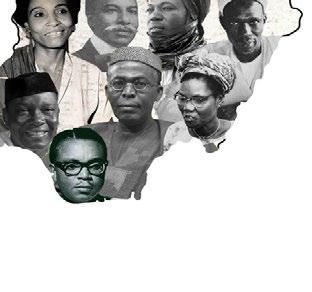


















Center Spread Half Page N1, 300, 000
Double Spread N1, 550, 000

Double Spread Half Page N1, 200, 000
10X6 N700, 000
10X5 N650, 000
10X4 N600, 000
10X3 N500, 000
9X6 N440, 000
9X5 N395, 000
9X4 N335, 000
9X3 N310, 000

8X6 N410, 000

8X5 N380, 000
7X5 N320, 000
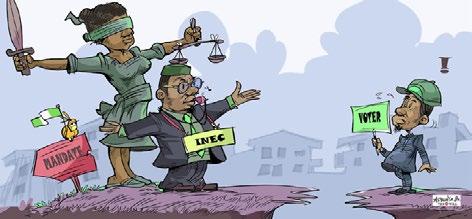



7X4 N315, 000
6X5 N280, 000

6X3 N145, 000
6X2 N85, 000
5X2 N70, 000
4X4 N160, 000
4X3 N95, 000
4X2 N65, 000
3X3 N60, 000
3X2 N50, 000
2X2 N30, 000
2X1 N15, 000
1X1 N7, 000
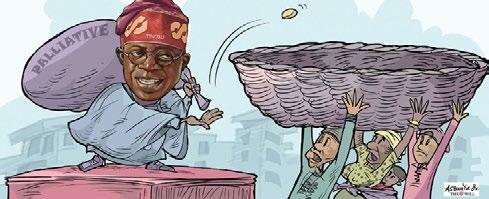
























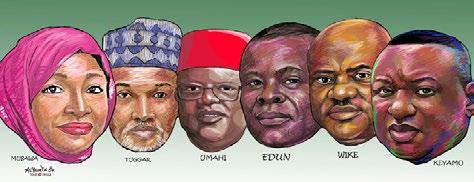

President Bola Tinubu’s apparent celebration last Sunday of the public good that followed his decision to grant the Minister of the Federal Capital Territory, Nyesom Wike’s request to remove the FCT from Treasury Single Account, TSA, has once again raised concern about the value of that policy to speedy discharge of valuable service delivery to Nigerians.
According to the President, his administration’s decision to remove the Federal Capital Territory (FCT) from the TSA has led to the acceleration of development and enhancing its citizens’ participation in governance.
He noted that the bureaucracy associated with the TSA had hindered infrastructural growth in the FCT, necessitating a review for better impact and progress.
According to him, freeing the FCT from TSA restrictions has facilitated infrastructural development, improved healthcare services and strengthened security measures.
“I remember the day the FCT minister came to me and said, ‘Please take us out of the problem of the TSA so I can do more work and achieve more.’ I asked him to show me his plans and he did. From there, everything changed rapidly.
“I started seeing the opening up of rural areas, the resuscitation of abandoned projects and the completion of the Vice President’s official residence, which had been left unattended for years. The FCT also rehabilitated healthcare centres, upgraded school facilities and provided furniture,” Tinubu said.
The President commended Wike for

Some other research suggests that the TSA may not have fully realized the expected gains in terms of increased tax revenue. But the single concern that cuts across all critics and admirers alike was “challenges include a lack of sincerity on the part of the government, legal barriers and issues with accountability and transparency
demonstrating the need to free the FCT from bureaucratic bottlenecks and for restructuring the territory’s public service to ensure civil servants could aspire to higher positions.
We recall that the TSA, introduced and piloted in 2012, using a unified structure of accounting for 217 government Ministries, Departments and Agencies, MDAs, for accountability and transparency in public fund management, kicked off in 2016, with the aim to curb official corruption.
But over time, public criticisms have been mounting over the policy. Chief among the seasoned critics are the Academic Staff Union of Universities, ASUU, whose staff suffered untold salary adjustments, half payments and unexplained deductions because of the template used in calculating their emoluments.
While not opposed to the policy in principle, ASUU was able to prove that it negatively impacted the running of universities, making it difficult to conduct academic programmes.
Some other research suggests that the TSA may not have fully realized the expected gains in terms of increased tax revenue. But the single concern that cuts across all critics and admirers alike was “challenges include a lack of sincerity on the part of the government, legal barriers and issues with accountability and transparency.”
In due course, all of them were proved right. First Secretary to the Government of the Federation the TSA implementing President Muhammadu Buhari’ administration, Babachir Lawal, was implicated in an alleged “N544 million cutting grass contract,” for which he was
prosecuted by the Economic and Financial Crimes Commission, EFCC, until November 18, 2022, when a High Court of the FCT, discharged and acquitted him.
In the same vein, Minister of Humanitarian and Disaster Management, Umar Farouq, was recently hauled by the EFCC for questioning over allegations of corruption in the handling of N37.1 billion social intervention funds during her tenure. His successor, Beta Edu, who was suspended by President Tinubu over unexplained expenditure of N585 million, is also a pointer to the zero impact of the TSA, whose main aim is to improve cash management, transparency and accountability in public finance.
So, over the years, the assumptions have persisted that it would change nothing unless corrupt officials were treated as criminals, prosecuted and jailed, while internal mechanisms to block leakages and wastage in public offices were installed. Indeed, the biggest blow so far to public graft a la TSA is the pending investigation by the EFCC, of a former, suspended Accountant General of the Federation, Ahmed Idris, for allegedly stealing N109 billion.
The case which has dragged on since May 2022, was adjourned by Justice Yusuf Haliu of the Federal High Court, Abuja, to May 7, 2025 for continuation of trial-within-trial. We support the President’s waiver granted the FCT. It is clear proof that the policy has outlived its usefulness, if it was ever on. The President should therefore vacate the policy and allow other government agencies and ministries to deliver service delivery under strict adherence to due process.
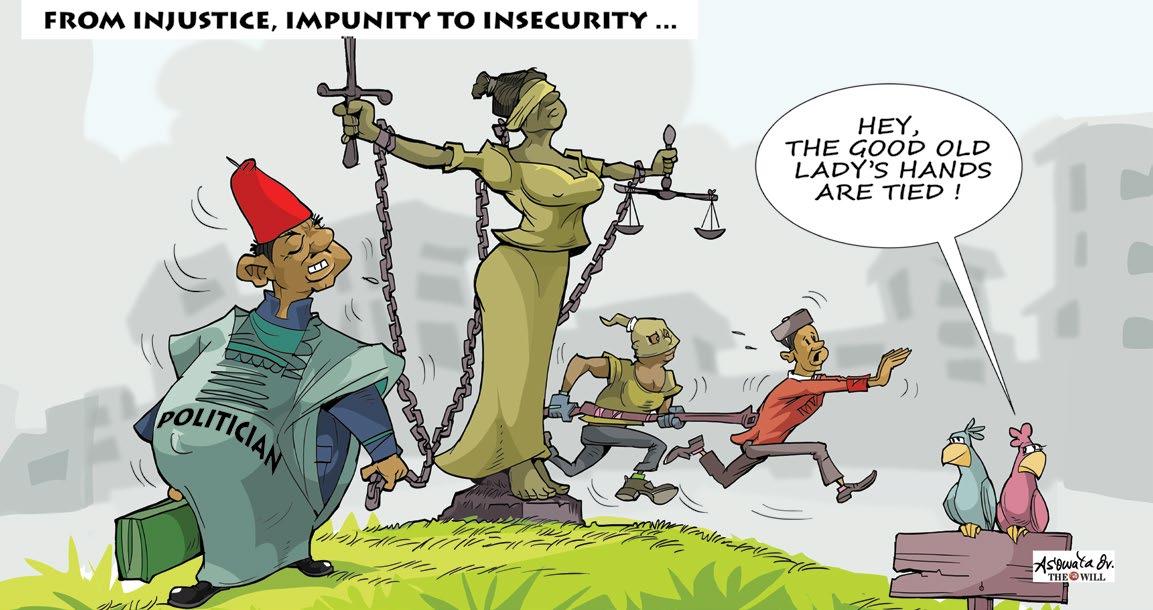




BY SUNDAY ONYEMAECHI EZE
ALagos-based National Youth Service Corps (NYSC) member, Ushie Rita Uguamaye, recently ignited a social media storm with a viral video expressing her profound frustration over Nigeria’s deteriorating economic situation under President Bola Ahmed Tinubu’s administration. She pointedly criticized the President’s leadership style, labeling it as “terrible.”
Overcome by emotion, the young corps member tearfully recounted her inability to afford basic necessities like a crate of eggs in a nation often described as having abundant resources. Her candid outburst, as is typical, drew a spectrum of reactions, both supportive and critical.
For many discerning Nigerians, Uguamaye’s sentiments merely echoed the harsh realities faced daily since the inception of Tinubu’s administration in 2023. Her video, though from an unexpected voice, served as a potent reinforcement of the prevailing hardship across the country.
Ironically, the current administration had pledged during its campaigns to ensure the affordability of these very essential goods, only to seemingly renege upon assuming office – a familiar and unfortunate pattern for Nigerians during and after electoral cycles.
While countless citizens endure their struggles silently, someone had to take the bold step of speaking truth to power. Ushie Rita Uguamaye, in essence, did just that on behalf of numerous Nigerians. She deserves commendation for bringing the stark reality of the adversities facing the populace to the President’s attention.
The government had not only promised an increase in corps members’ allowances from N33,000 to N77,000 but also announced an effective implementation date. Yet, this promise remained unfulfilled until recently.
It is plausible that Uguamaye’s public outcry played a significant role in the eventual disbursement of the new NYSC allowance. It is regrettable that the government appears to have resorted to face-saving measures in fulfilling its obligations.

Predictably, the Senior Special Assistant on Media and Publicity to the President, Temitope Ajayi, in what seemed like a rushed attempt to demonstrate his diligence (where critics argue little exists), echoed previous administrations by suggesting that the corps member deserved severe punishment for daring to voice the widely felt concerns about the President’s leadership.
Ajayi argued that while ordinary citizens might have the right to criticize the President, a corps member should be exempt from such rights. This raises a fundamental question: when did the right to freedom of expression cease to apply to NYSC members in Nigeria?
One is also compelled to ask what could be more “terrible” than subjecting a majority of the population to live below the poverty line in a nation as richly endowed as Nigeria? Those whose policies have deliberately strangled the nation deserve far greater scrutiny than Ushie. Following her initial video, Uguamaye released another, drawing attention to alleged threats from NYSC officials who were reportedly pressuring her to remove the initial video.
TIMES ARE UNDENIABLY TOUGH IN NIGERIA. THE PALPABLE HARDSHIP, HELPLESSNESS, AND HOPELESSNESS ARE EVIDENT. ONE THING IS CLEAR: THE NIGERIAN ECONOMY IS IN A DIRE STATE, AND THE NATION IS IN DESPERATE NEED OF SOLUTIONS
She posted, “Dear Nigerians, I am already getting threatened by the NYSC board to stop speaking on this issue. They have my address. If you don’t see me online, you know who to hold accountable.” Meanwhile, Uguamaye’s stance on President Tinubu’s leadership, as expressed in her video, and her allegations against the NYSC have generated considerable concern among Nigerians.
Numerous well-meaning individuals and organisations have voiced their opinions on the matter, both in support and against her actions. Her exercise of free speech resonated with many, while others criticized her chosen method of expressing grievances. Former Vice President Atiku Abubakar, in a statement on X (formerly Twitter), lauded her courage and resilience.
Atiku described her as representative of a new generation of politically conscious women, drawing parallels with past female activists like Gambo Sawaba, Funmilayo RansomeKuti, and Margaret Ekpo. “Rather than being met with
BY ERASMUS IKHIDE
Yesterday, President Bola Ahmed Tinubu’s seemingly helpless and detached response to the killing of suspected kidnappers/terrorists in Edo State came to the fore. His terse message, delivered in a casual and dismissive manner, stated: “I condemn the murder of travelling hunters intercepted by local vigilantes in the Uromi community of Esan North East Local Government Area of Edo State.
“I have directed the Police and other security agencies to conduct swift and thorough investigations and punish the suspected culprits. “I commiserate with the families of the affected victims and assure them that criminals would not be allowed to shed the blood of innocent Nigerians in vain.”
This scripted press statement, often issued from the Aso Rock Presidential Villa whenever tragedy strikes, serves to evade scrutiny and elicit empathy. However, it fails to adequately address the security failures plaguing Nigeria or provide a comprehensive explanation of the Uromi incident that occurred two days prior.
While I condemn extrajudicial killings, as witnessed in Uromi, Edo State, in the strongest possible terms, it’s crucial to present a complete account of the events. Retired Major General Cecil Esekhaigbe, during a Channel Television broadcast, corroborated an eyewitness account of the unfortunate incident. The General stated that, acting on intelligence indicating the movement of seasoned kidnappers back to the north, vigilantes mounted roadblocks, searching northern-bound trucks, including some belonging to Dangote. During an attempt to search one particular truck, a Fulani man, described as a radical Fulani terrorist, drew a knife and stabbed a vigilante. In response, the other vigilantes and youths (a mob) attacked them, leading to the subsequent deaths.
However, General Esekhaigbe’s Channel Television live interview omitted crucial details.
These include the discovery of substantial amounts of cash, running into millions of naira, on the suspects, believed to be proceeds from ransom payments, as well as dangerous weapons, including assault rifles and AK-47s. It is important to note that the vigilante group’s actions were likely driven by the fact that
Edo State has been under siege in recent months, with over 200 deaths attributed to Fulani terrorists, along with countless rapes, maiming, and unprovoked murders across the state. I have come across comments, such as one from @Auwal H. Mohammad on Facebook, threatening northern retaliation for the killing of these terrorists in Edo, whom he refers to as hunters.
He also pointed out that southerners conduct legitimate businesses in the north without harm. It’s clear that Auwal and his ilk are well aware of the true purpose of Fulani herders/terrorists in southern Nigeria, which is certainly not hunting, as he claims. If the Fulani presence were purely for hunting, they should confine themselves to northern forests like the Sambisa Forest and other northern regions, to prevent tension and recurrent bloodshed.
Auwal is among the disingenuous northerners who often claim that the killer herders are not Nigerian Fulani, yet rush to their defense when they become victims of their own crimes. Reports indicate that 14 suspects have been arrested in Uromi by the police, a significant development. However, it is equally concerning that the killers of Deborah Samuel in Sokoto remain at large, despite being identified as students from her school and classmates.
THE REQUEST FOR AN “UNRESERVED PUBLIC APOLOGY FROM UROMI AND EDO STATE AUTHORITIES” AND A DEMAND FOR COMPENSATION FOR THE FAMILIES OF VICTIMS HAS NEVER BEEN IMPLEMENTED FOR VICTIMS OF THE ACTIVITIES OF CRIMINAL HERDERS IN SOUTHERN NIGERIA
This lack of progress in bringing them to justice starkly exposes the failures of Nigeria’s justice system. Similarly, the absence of arrests in the rapes and murders in the Esan area is another example of systemic failures that allow perpetrators to evade punishment.
The recent outburst, via a press statement, by the spokesperson for the Northern Elders Forum (NEF), Professor Abubakar Jiddere, regarding the Uromi incident, further highlights the double standards in the investigation and prosecution of heinous crimes in Nigeria.
Have we ever heard of the arrest and prosecution of criminal herdsmen in Nigeria who have maimed and killed Nigerians? The NEF’s demand that the arrest and trial of those involved in the Uromi mob action be made public would be an exercise in applying different standards of justice, which is an abomination.
The request for an “unreserved public apology from Uromi and Edo State authorities” and a demand for compensation for the families of victims has never been implemented for victims of
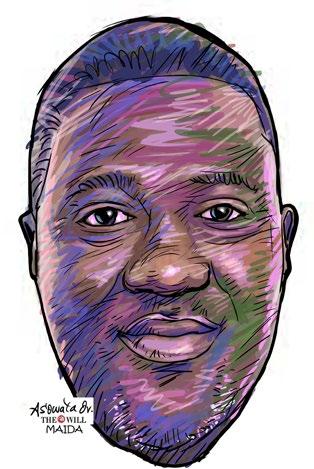
Following recent reforms, the Nigerian Communications Commission (NCC) continues to promote initiatives that would ensure that the telecommunications operators offer quality service delivery to the consumers.
Part of this measure is the Draft Guideline on Unclaimed Recharges to see to it that telecom service users are not shortchanged.
The recent announcement of the draft guidance document on unclaimed recharges marks a significant step towards enhancing regulatory clarity and efficiency in the telecommunications sector.
This move reflects the Commission’s commitment to fostering a transparent and wellstructured industry framework.
Dr. Aminu Maida, the Executive Vice Chairman of the NCC, has emphasised that this initiative is in line with the Commission’s statutory obligations as outlined in the Nigerian Communications Act of 2003.
He recalls that the NCC has a history of taking proactive measures to refine telecommunications policies.
According to him, the Commission has consistently championed consumer rights, fair competition, and sustainable industry growth.
For example, the implementation of stringent SIM registration guidelines and enforcement of quality-of-service regulations have played a pivotal role in shaping the telecom landscape. The release of the draft guidance document on unclaimed recharges represents another milestone in the NCC’s regulatory journey.
EDITOR Sam Diala
The change of baton at the Nigerian National Petroleum Company Limited (NNPCL) on April 2, 2025, ended the tenure of Mallam Mele Kyari as the Group Chief Executive Officer (GCEO) of the behemoth national oil firm. His over five- year tenure showed him as one with immense energy for storytelling.
Mele Kyari is a rapper; he talks at the least opportunity and quickly delves into storytelling. He has the future to foretell at any given time. Just give him the window, he embarks on navigating the stream of storytelling. With Kyari, it is always a prophecy, a promise or a vow – something to soothe the nerves of his audience. “I assure you .…” “Let me assure you ….” “I can assure you ….” And he speaks with the strong voice of one interacting with the gods holding the periscope that peeps into tomorrow.
Speaking at the valedictory session for his successor, Dr Maikanti Baru, on July 6, 2019, in Abuja, Kyari disclosed that the new NNPC management (to be headed by him) would transform the country into a net exporter of petroleum products before the end of the tenure of President Muhammadu Buhari.
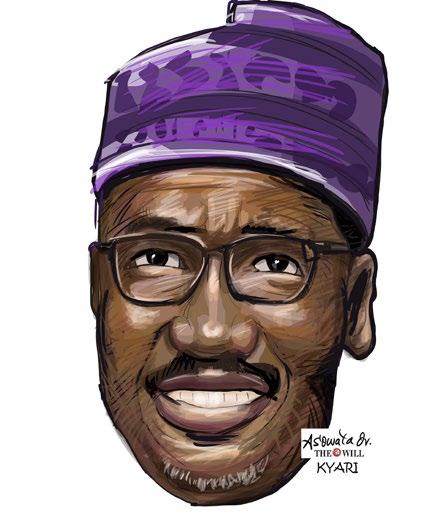
He noted (or boasted) that under his watch, the NNPC (as it was called then) would provide the much-needed incentives that would help the petroleum industry grow crude oil production to three million barrels per day and shore up the country’s crude oil reserves to 40 billion barrels.
He said: “I assure you that we will follow up to ensure that within the life of this administration -- before President Muhammadu Buhari’s tenure ends in 2023 -- we will deliver on the four refineries.”
He also pledged to show immense support to ensure the delivery of the Dangote Refinery in 2020. In fact, at the inauguration of the facility on May, 22, 2023, Kyari told the world that NNPCL would supply Dangote Petroleum Refinery 300,000 barrels of crude per day effective July 2023.
VISIBLE PIPEDREAM
Delivering the four NNPCL refineries in Port Harcourt (2), Warri and Kaduna became a visible pipe dream under Kyari as he continued to push what looked like the soothsayer agenda. He never stuttered in his utterances because he is a smooth talker in whom there are no hesitations. In due course, Port Harcourt Refinery became an unending refrain.
During the nationwide strike by organised labour in July 2023 to protest the excruciating hardship resulting from the removal of fuel subsidy, President Bola Tinubu gave his commitment that the Port Harcourt Refinery would resume production in December, 2023 – a date supplied by NNPC under Kyari.
‘Promise kept’
end of December and get the other plants running in 2024. Today, we have kept those commitments,” it quoted Mele Kyari as announcing during a facility tour of the plant.
However, contrary to expectations anchored to the promises of Kyari, the Port Harcourt Refinery failed to resume actual production in December 2023 as promised. The true state of the facility has remained unestablished since then. Only recently, the refinery was celebrated “for running 180 days non-stop”. Yet Nigerians are yet to feel the impact of the resumption of production at the Port Harcourt Refinery. Instead, importation of refined petroleum products has resumed in earnest following the collapse of the naira-to-crude deal with the Dangote Petroleum Refinery. PREVIOUS VERSIONS
Before then, Kyari’s storytelling had resonated at another event. Speaking at the Petroleum and Natural Gas Senior Staff Association of Nigeria (PENGASSAN) Energy and Labour Summit 2023 in Abuja on October 9, Kyari said, as a resource-dependent country, Nigeria should not be exporting 100 percent of its crude as it does at present.
“Today, we export 100 per cent of our productions, no resource-dependent country does this and that is why we must deliver on our mandate. I don’t want to speak about it; when it is done, you will see it. “So, I don’t want to tell you we are going to revamp our refineries. That is too much of PowerPoint talks. So, it will be done and you will see it. I don’t want to speak about it, we are tired of speaking about it. “But what we must achieve is that this country must be a net exporter of petroleum products and this is within sight,” Kyari said.
SIMILAR NARRATIVES
While delivering his address at the Nigeria Oil and Gas Opportunity Fair held at the Nigerian Content Development and Monitoring Board (NCDMB) Conference Centre, Bayelsa, in May 2023, with the theme ‘The oil and gas industries: Catalyst and fuel for the industrialisation of Nigeria’, Kyari told his usual story.
He said, “The NNPC saw the strategic interest of doing business, and we will be supplying 300,000 barrels of Nigerian crude to Dangote Refinery from NNPC. That is a marketing opportunity.” The opposite turned out to be the real outcome.
ACROSS THE ATLANTICS
To ensure comprehensive stakeholder participation, the NCC has scheduled a Virtual Stakeholders Forum for industry players, consumer advocacy groups, and the general public to engage in critical discussions and provide feedback.
The NCC declared that the consultative approach highlights the Commission’s commitment to engaging stakeholders in the regulatory process.
Additionally, the Commission has opened Continues on page 35
Towards the end of the year, the NNPCL alerted Nigerians that it had delivered the facility. In a press release on December 21, 2023, signed by the NNPCL Chief Corporate Communications Officer, Olufemi O. Soneye, entitled “NNPC Ltd Fulfils Promise, Delivers Port Harcourt Refinery … Achieves Mechanical Completion, Flare Start-up of Refinery’s Area 5 Plant”, the national oil company claimed it had achieved its target of returning the facility to production in that month.
“In our quest to ensure that this refinery is re-streamed to continue to deliver value to Nigerians, we made a promise that we would reach a mechanical completion of phase one of the rehabilitation project by the
Reacting to Kyari’s television interview in Nigeria, Reuters on June 1, 2023, reported: “Nigeria’s state-owned oil company NNPC will soon end its monopoly on petrol supplies, its chief executive told local television on Thursday, a day after it nearly tripled prices at its fuel stations countrywide.
“Mele Kyari told Arise TV that prices were expected to come down once new companies started supplying petrol, bringing more competition.
“ All we did was to set variable prices depending on our costs by location and knowing full well that NNPC is the single supplier of the market and we are seeing that exit coming very, very quickly.
“There will be no monopoly, NNPC




Continues from page 34
will not continue being the supplier of this product alone’,” Reuters quoted Kyari as saying.
In a dramatic turn, Kyari later stated that none of the importers licensed to bring in petrol have the capacity to do that, so NNPC will remain the sole importer.
“None of them (fuel companies) can do it today. For them, access to foreign exchange (FX) is difficult. We create FX, therefore we have access to FX and their access to FX is limited” – thus altering Kyari’s import liberalisation theory.
After decades of total reliance on imported petroleum products, the (NNPCL in November 2024, announced that it had finally ended the age-long practice. The NNPC’s GCEO, Mele Kyari, said at the 42nd Nigerian Association of Petroleum Explorationists (NAPE) annual international conference and exhibition in Lagos, that the national oil company “is now off-taking fuel from the Dangote Petroleum Refinery and other local refineries”.
His company later denied him; maintaining that it had not ended importation of petroleum products contrary to what the organisation’s helmsman had said.
However, the same Mele Kyari LATER told the Speaker of the House of Representatives, Tajudeen Abbas, that going by the improvement in local production at the Dangote Petroleum Refinery and the revival of the nation’s four refineries, the country would end the importation of refined petroleum products in December 2024.
Kyari’s optimism followed the NNPC’s naira-for-crude agreement with Dangote Petroleum Refinery in July 2024. Under the arrangement, the NNPC was expected to supply crude oil to Dangote Petroleum Refinery in exchange for refined products, which would then be distributed across the country to stabilise the fuel market.
According to NNPC, the development was expected to save Nigeria as much as $10 billion in hard currency in-country annually, as the national oil company said it now receives crude from the 650,000 barrels per day Dangote Petroleum Refinery located in Lagos. This narrative remained a reality in the air.
AS KYARI GOES …
Recalling Kyari’s earlier promise of 300,000 barrels of crude daily to
Dangote Petroleum Refinery effective July 2023, industry experts at the time had questioned how NNPCL would source the crude given the epileptic supply that had characterised its production culture.
Continues from page 34

United Capital Plc, a leading panAfrican financial and investment services group, held its 12th Annual General Meeting (AGM) at the Transcorp Hilton Hotel, Abuja, where shareholders approved a total dividend payout of N14.4 billion for the 2024 financial year. This represents a 33% increase from the previous year, reinforcing the company’s commitment to delivering exceptional value to its investors.
The meeting, which brought together shareholders and key stakeholders, served as an opportunity to review the company’s outstanding results for the 2024 financial year and outline its strategic vision for continued growth.
In his opening remarks, Prof. Chika Mordi, Chairman, United Capital Plc, highlighted the company’s outstanding financial performance despite macroeconomic challenges. “In 2024, our Profit Before Tax (PBT) accelerated by 74.0% year-onyear to N30.10 billion in 2024, indicating impressive growth in the overall profitability of the Group.
“In terms of our financial position, the Total Assets of the Group appreciated by 82.6% year-on-year to N1.7 trillion.”
Prof. Mordi reassured investors of the company’s commitment to sustaining this

Consequently, the naira-for-crude deal appeared a move to strengthen the pledge in what looked like an exercise in exceptional patriotism. But the excitement was short-lived.
Dangote in March 2025 announced the end of the deal on the ground that NNPCL had not fulfilled its part of the bargain by supplying it with the required feedstock.
In a statement entitled, ‘Temporary Suspension of Sales of Petroleum Products in Naira,’ the management of Dangote Petroleum Refinery explained that the decision was necessary to align its sales currency with the crude procurement currency.
“To date, our sales of petroleum products in naira have exceeded the value of naira-denominated crude we have received. As a result, we must temporarily adjust our sales currency to align with our crude procurement currency,” the statement read.
According to NNPCL, its default stemmed from shortage of crude as it had many forward commitments.
NNPCL has been unable to meet its crude oil supply obligations to local refineries due to its focus on servicing oil-backed loans. These loans which are tied to future crude oil productions have taken precedence over domestic commitments, leaving Dangote and other local refiners scrambling for supply.
There is simply not enough crude to go round for the interest of local refineries, and this is not likely to change any time soon as some of the crude-backed obligations last till 2030.
What about the Kolomani oil and gas wells in the North-East Gombe and Bauchi area, with Oil Prospecting Licence 809 and 810 commissioned by former President Buhari in November 2022? The field, according to NNPCL, was to start producing about 50,000 barrels of crude oil per day as it holds over one billion barrels of crude oil reserves, shooting up Nigeria’s oil reserves to over 38 billion barrels.
Again, this is not likely to happen in the nearest future; it was all part of Mallam Mele Kolo Kyari’s storytelling package.
channels for written submissions from stakeholders to ensure that all relevant perspectives are considered in the final regulatory framework.
Reflecting on past interventions, the NCC said its dedication to transparency and sectoral collaboration is evident.
“The Commission’s handling of past regulatory challenges, such as data pricing policies and consumer protection initiatives, demonstrates a track record of responsiveness and strategic policy development.
“The current consultation on unclaimed recharges further solidifies the NCC’s position as a forward-thinking regulator committed to industry best practices.”
The telecoms regulator emphasized that as the deadline for feedback approaches, stakeholders are urged to actively participate in shaping these regulations, as their contributions will not only influence the final framework but also help define best practices for managing telecom resources efficiently.
Stakeholders and industry experts affirm that the NCC’s openness to industry input
underscores its commitment to fostering a balanced regulatory environment that benefits both service providers and consumers.
With the telecommunications sector playing a crucial role in Nigeria’s digital economy, the outcome of this policy initiative will have farreaching implications.
The Commission’s continued drive for innovation, consumer protection, and sectoral growth reaffirms its position as a regulatory body dedicated to national development. The NCC’s consultative approach and commitment to regulatory excellence set a strong foundation for the future of the telecommunications sector in Nigeria.
“In nutshell, the NCC’s unveiling of the draft guidance document on unclaimed recharges represents a significant milestone in the Commission’s regulatory journey.
“Through proactive measures, stakeholder engagement, and a commitment to transparency, the NCC is shaping the telecommunications sector in Nigeria for sustainable growth and development,” the regulator said.
momentum, stating that United Capital remains well-positioned to deliver even greater returns in the coming years.
The declaration of a final dividend of N0.50 per share, complementing the interim dividend of N0.90 per share distributed within the financial year, received unanimous shareholder endorsement.
Investors commended the company’s consistent delivery of strong returns, spotlighting the previously declared 2-for-1 bonus share issuance that significantly enhanced their equity positions. This robust shareholder value creation is reflected in the 47% growth of Shareholders’ Funds to N133.50 billion
Peter Ashade, Group CEO, United Capital Plc, attributed the company’s continued success to strategic execution, operational excellence, and the dedication of its leadership team and employees.
“We remained committed to our mission to create sustainable value for our stakeholders despite a volatile operating environment.
Our market capitalization surged by 200% to N396 billion, while our Return on Average Equity (RoAE) stood at 21.5%, underscoring the wealth creation and business stability we have achieved,” he said.
Looking ahead, Ashade reaffirmed United Capital’s commitment to sustaining its
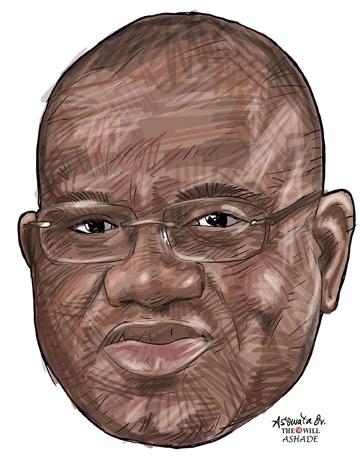
growth trajectory and delivering superior performance in 2025.
“Our focus remains on expanding our market leadership, enhancing innovation, and driving long-term value creation,” he said.
Following a profitable year with the firm leading key transactions, expanding into digital banking, consumer finance and recording impressive growth in funds under management, the Group is determined to

solidify its position as a high-performing, sustainable financial services group, with key strategic expansion into new markets and sectors, setting new standards of excellence in Africa’s financial landscape.
United Capital Plc’s 2024 stellar performance was born out of the bold move earlier in the year to reshape its capital structure, which analysts predicted might influence investor sentiment.
At an Extraordinary General Meeting held virtually on August 21, 2024, the company announced a bold plan to increase its share capital from N3 billion to N9 billion and issue a bonus of 12 billion new shares of 50 kobo each, while the total outstanding shares rise from 6 billion to 18 billion.
The restructuring reallocated N6 billion from the company’s retained earnings to share capital, effectively capitalizing these earnings into equity. This was predicted to likely reduce retained earnings further.
United Capital is listed on the Nigerian Exchange Limited (NGX) and is at the forefront of becoming the financial and investment role model across Africa by leveraging on innovation, technology, and specialist skills to exceed client expectations, while creating more value for all stakeholders, according to investment analysts.

Recently, a Nigerian national daily reported with a bold headline: “EFCC Exposes 58 Ponzi Scheme Operators in Nigeria.” What a striking headline indeed!
According to the release circulated to the public, the anti-graft body assured Nigerians of its vigilance and proactive monitoring of every entity and player within the nation’s economic space. The goal is to safeguard the public from opportunistic, predatory operators while utilising its anti-corruption mandate to stimulate growth and development within the economy.
The release further alerted Nigerians and the general public by revealing the full names and identities of the operators of these 58 companies, which falsely posed as investment entities while defrauding innocent Nigerians of their hardearned income daily.
The EFCC further asserted that these 58 companies were never registered with the Central Bank of Nigeria (CBN)—the governmental agency responsible for regulating banking businesses in the country—nor with the Securities and Exchange Commission (SEC), which oversees capital market operations in Nigeria.
The origin of the Ponzi scheme is linked to an Italian businessman named Charles Ponzi, who famously used this scheme in the 1920s, although similar fraudulent schemes existed earlier.
A Ponzi scheme is characterised by using new investors’ money to pay off earlier investors, creating an illusion of profit and attracting even more unsuspecting investors into the scheme. It is essentially a form of business fraud where the operator links investors together, paying supposed “returns” to earlier investors with funds from newer investors.
In this fraudulent setup, the operator rewards old investors with new investors’ funds instead of generating legitimate business profits. The fundamental issue is that these schemes rely on a continuous influx of new investors to sustain payouts, making them inherently unsustainable. As soon as the operator can no longer attract new investors, the scheme collapses, often leaving the majority of participants in financial ruin.
Ponzi schemes have evolved through different phases. The early period of the 1920s marked the original model by Charles Ponzi. The classical period, from the 1950s to the 1980s, saw the expansion of these schemes with increased sophistication.
The telemarketing era of the 1980s and 1990s introduced direct calls and promotions. The email and internet era of the 1990s to the 2000s saw online fraud and phishing becoming rampant. The crowdfunding and social media era of the 2000s to the 2010s leveraged digital platforms.
The blockchain and cryptocurrency era from the 2010s to the 2020s further complicated fraudulent investments. Finally, the modern Ponzi schemes of the 2020s rely on targeted marketing and online influencers to sell their fraudulent brands. Typically, Ponzi schemes start by promising
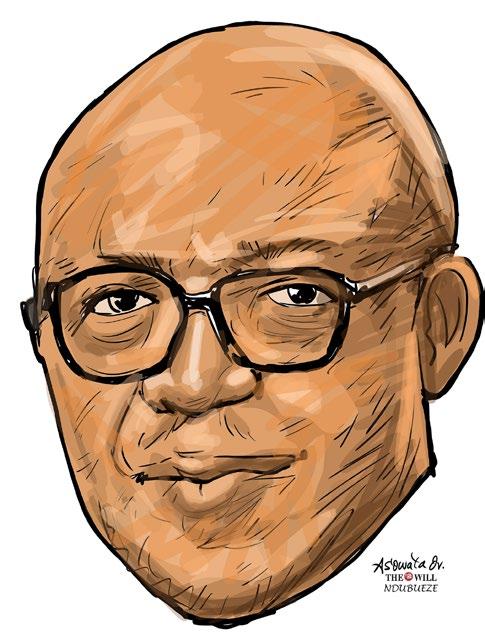
unusually high returns, using funds from new investors to pay earlier participants, and then disappearing when it becomes unsustainable.
The EFCC’s public declaration exposing Ponzi scheme operators is a clear demonstration of the Federal Government of Nigeria (FGN) and President Bola Ahmed Tinubu’s commitment to eradicating financial fraud, white-collar crime conspiracies, Ponzi schemes, and other financial crimes within the system.
This action underscores Nigeria’s dedication to good governance, economic stability, and global cooperation in combating financial crimes. By making this information public, the EFCC strengthens Nigeria’s global reputation as a country actively fighting financial fraud. This action enhances Nigeria’s credibility among the international community and boosts investor confidence at a critical time when the country is actively seeking increased Foreign Direct Investment (FDI). Additionally, this move reinforces President Bola Ahmed Tinubu’s stance against financial fraud, Ponzi schemes, and cybercrimes.
The EFCC plays a crucial role in naming and shaming Ponzi scheme operators. It also carries out public enlightenment programmes on the dangers of Ponzi schemes, advocates against fraudulent investment operations, and prosecutes defaulters in court to ensure justice is served.
In light of the EFCC’s fight against Ponzi schemes and other financial crimes, other anti-graft bodies must actively contribute to the effort.
These include the Independent Corrupt Practices

Typically, Ponzi schemes start by promising unusually high returns, using funds from new investors to pay earlier participants, and then disappearing when it becomes unsustainable
and Other Related Offences Commission (ICPC), the Special Investigation Panel (SIP), the Public Complaints Commission (PCC), the Code of Conduct Tribunal (CCT), and the Code of Conduct Bureau (CCB).
Others are the Bureau of Public Procurement (BPP), the Nigeria Extractive Industries Transparency Initiative (NEITI), the Due Process Review and Public Procurement (DPRPP), Civil Service Reform (ServiCom), and the Nigerian Financial Intelligence Unit (NFIU).

THE ROLE OF ANTI-GRAFT AGENCIES
IN PUBLIC TRUST AND TRANSPARENCY
These anti-graft bodies help build public trust and restore investor confidence by investigating Ponzi schemes and financial fraud. Their roles include conducting systematic studies to identify corruption risk factors, developing anti-corruption strategies to prevent financial crimes, and promoting transparency and accountability in governance.
They organise capacity-building programmes to combat Ponzi schemes and fraud, encourage whistleblower protection and public interest reporting, conduct public enlightenment campaigns to educate citizens, recover stolen assets from fraudsters, and enforce financial laws to the fullest extent.
Through the EFCC’s bold move, Nigeria is positioning itself as a safe haven for legitimate investment and a country with zero tolerance for white-collar crime, financial fraud, cybercrime, and Ponzi schemes.
However, Nigerians must remain vigilant and cautious of fraudulent investment schemes masquerading as legitimate businesses. These entities have short-lived lifespans and should not be trusted merely because they promise extraordinarily high returns.
To be forewarned is to be forearmed.
•Ayozie is a Chartered Accountant and Public Affairs Analyst

BY TOPE FASORANTI
Temilayo, a petty trader, saw electronic transactions hitting an all-time high of N1.08 quadrillion in 2024. She vowed never to use electronic banking channels for fear of being defrauded.
Amaka, a secondary school teacher, would rather endure the inconvenience of visiting a bank branch than embrace the ease of digital banking. Her fears have only deepened over the past year, with alarming reports such as the N44 billion fraud and the hacking of over 1,000 accounts in two of the FUGAZ banks. There was also the N21.2 billion loss suffered by a fintech company due to a so-called ‘technical glitch’. Electronic fraud (e-fraud) in Nigeria targets both institutions and individuals using increasingly sophisticated methods. With POS (point-of-sale) transactions reaching N18 trillion, total points are only expected to rise.
Does this mean electronic banking is a curse? It may feel that way at times, but nothing good comes without risks. Water is essential for life, yet people have drowned from drinking too much. Aeroplanes offer convenience, yet crashes still occur. In the same vein, we cannot disregard the immense benefits of electronic banking simply because of fraud. Instead, we must continuously review, refine, and enhance our platforms, processes, and products to improve security.
This article explores electronic fraud and how we can use digital banking solutions safely, efficiently, and appropriately.
With solutions such as instant merchant settlements and near real-time transfers, Nigeria’s payment system ranks among the most advanced globally. According to ACI’s Prime Time for Real-Time report, Nigeria leads Africa in real-time payments and is among the top ten worldwide.

The Nigeria Inter-Bank Settlement System (NIBSS) reported that the value of electronic transactions surged to N1.08 quadrillion in 2024, an 80 percent increase from N600 trillion in 2023. Nigeria boasts a wide range of digital banking solutions, including mobile, internet, USSD, and chat banking, as well as payment gateways with multiple options such as card payments, wallets, transfers, e-mandates, QR codes, USSD, phone numbers, and pay-by-link services. POS terminals and agency banking further expand access. These diverse electronic channels offer convenience and flexibility, allowing users to choose solutions that fit their lifestyles. However, they have also created multiple entry points for fraudsters.
Total fraud losses recorded by Nigerian banks in 2024 stood at N52.26 billion from over 70,000 transactions, according to a report citing data from the Nigeria Interbank Settlement System (NIBSS). This represents a staggering 4.5-fold increase from the N11.61 billion lost during the same period in 2023, with the majority of these fraud cases originating from electronic channels.
Fraud targeting financial institutions is often facilitated by insider collusion, while fraud against individuals primarily succeeds due to user negligence or lack of awareness. In most cases, fraudsters

manipulate individuals into revealing their security credentials through social engineering tactics, including scam calls, deceptive messages, malware, and fake websites.
Transaction authorisation in Nigeria typically relies on one or more authentication methods— such as PINs, passwords, passcodes, tokens, OTPs, fingerprints, facial recognition, or iris scans. However, nearly all successful fraud attempts occur when users unknowingly provide fraudsters with access to their accounts. According to the Check Point Software Technologies Global Threat Index, Nigeria remains a significant target for cybercriminals, ranking 11th globally for malware attacks in January 2025.
Institutional fraud, on the other hand, is primarily driven by deliberate actions of employees seeking to exploit internal vulnerabilities. In nearly every major institutional fraud case, at least one insider is involved, making internal fraud prevention more challenging.
The traditional maker-checker protocol is no longer sufficient to safeguard financial institutions, necessitating more advanced fraud detection and prevention measures.
Electronic banking offers convenience and flexibility, but staying safe is essential. Here are some key practices to protect yourself:
1.Choose a reputable financial institution that operates with integrity and is well-regulated.
2.Use banking channels that align with your lifestyle and security needs.
3. Enable two-factor authentication (2FA) for high-value transactions unless you use biometric authentication.
4. Never disclose your security information— including PINs, passwords, and OTPs—to anyone, regardless of how much you trust them.
5. Memorise your security credentials rather than
Total fraud losses recorded by Nigerian banks in 2024 stood at N52.26 billion from over 70,000 transactions, according to a report citing data from the Nigeria Interbank Settlement System (NIBSS)
writing them down.
6. Be cautious of unsolicited requests for sensitive details. Your bank will never ask for your PIN or password. If in doubt, visit a branch or call the official customer service line.
7. Report lost or stolen devices immediately and request a ‘no-debit’ status on your account while investigating the issue.
8. Avoid using public Wi-Fi and charging ports when accessing financial applications.
STRENGTHENING STAKEHOLDER COLLABORATION
Beyond individual responsibility, financial institutions, regulators, and other stakeholders in the digital finance ecosystem must continuously enhance security measures to combat e-fraud. Financial institutions should strengthen user authentication by leveraging biometric technology while integrating fraud detection tools that analyse transaction patterns, user behaviour, typing speed, IP addresses, and other risk indicators.
They must also implement advanced AI-driven cybersecurity measures to improve fraud prevention, enhance internal controls beyond the traditional maker-checker system to mitigate insider fraud, and foster collaboration among themselves to ensure a rapid response to reported fraud cases and facilitate fund recovery.
Regulators, on the other hand, must strike a balance between enforcing stringent security measures and fostering industry growth. Strengthening collaboration with financial institutions and technology providers is essential to staying ahead of emerging fraud trends and ensuring that the financial ecosystem remains both secure and innovative. E-fraud is a growing challenge, but digital banking remains an invaluable tool for financial inclusion and economic growth.
By adopting safer banking habits, strengthening institutional security frameworks, and fostering stronger collaboration among stakeholders, we can minimise risks while continuing to enjoy the benefits of a secure and efficient digital financial system.
•Fasoranti is an Economist, Banker, and Consultant on Digital Transformation
Photo Editor: Peace Udugba [08033050729]
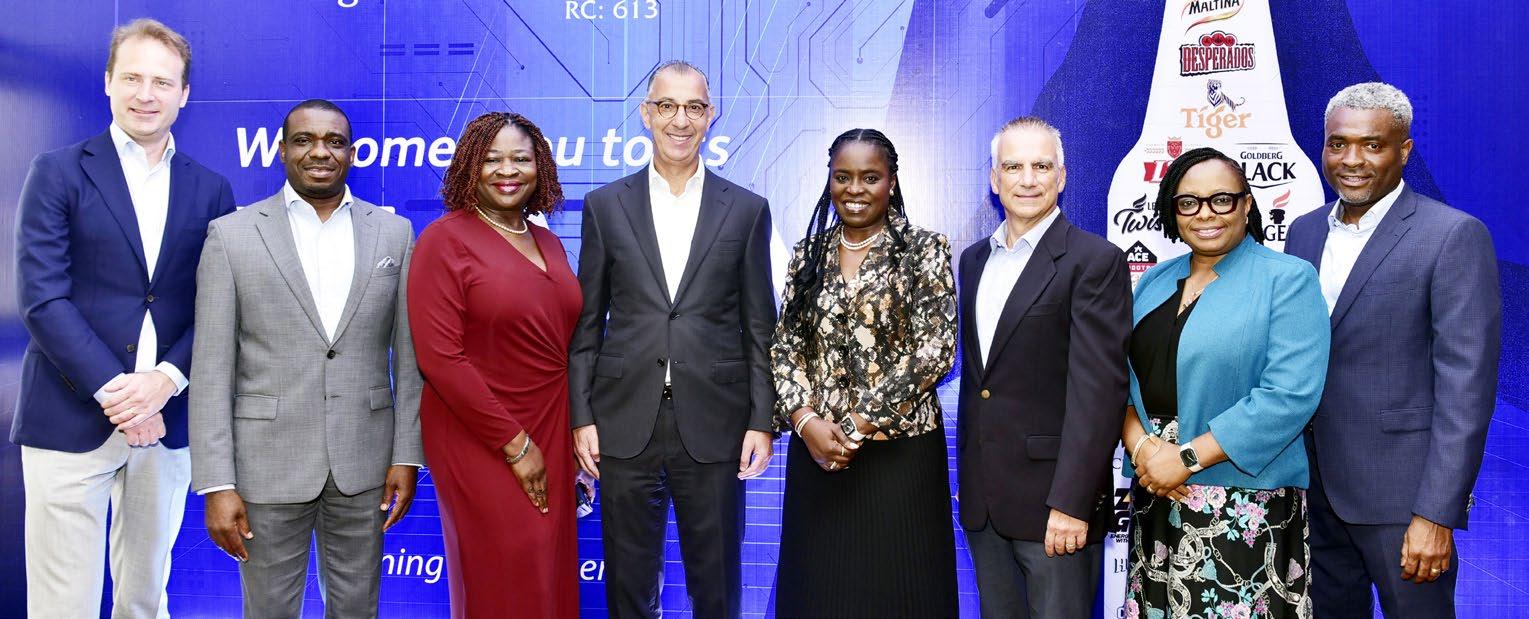


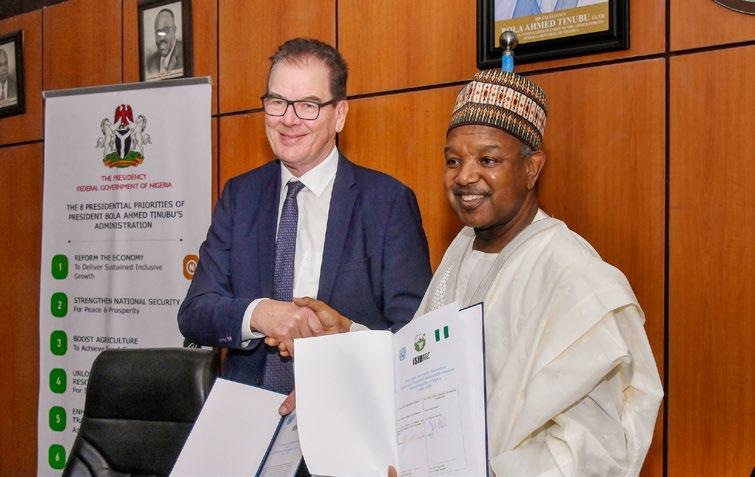
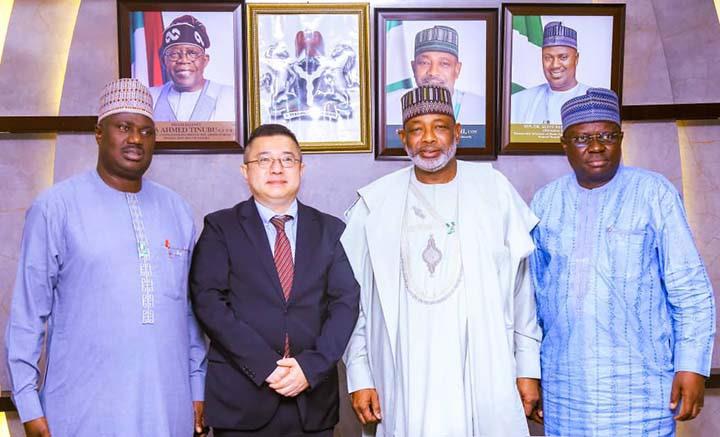





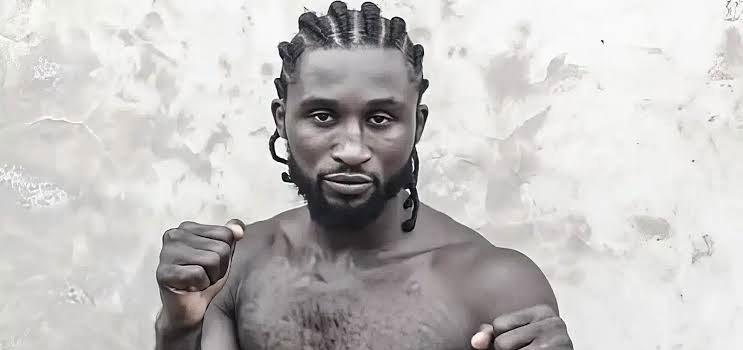
BY JUDE OBAFEMI
The recent death of Nigerian boxer Gabriel Oluwasegun Olanrewaju after collapsing during a bout in Ghana on March 29 has brought renewed attention to the safety measures in professional boxing across Africa. This incident, at the Bukom Boxing Arena in Accra, raises serious questions about the medical preparedness, regulatory oversight, and emergency response protocols in place at fight venues in the region. Olanrewaju, a 40-year-old former National and West African lightheavyweight champion, collapsed in the third round of an eight-round contest against Ghanaian boxer John Mbanugu. Despite efforts to revive him, he was pronounced dead 30 minutes after arriving at Korle-Bu Teaching Hospital.
The tragedy has sparked a debate about whether current safety standards in African boxing are sufficient and how they compare to practices worldwide. All of this must begin with the circumstances of Olanrewaju’s death, the responses from the Ghana Boxing Authority and Nigeria Boxing Board of Control before venturing into the wider implications for boxing regulations in Nigeria and West Africa and also the human cost of the sport.
Olanrewaju was a respected figure in Nigerian boxing, with a professional record of 13 wins, eight losses, and three draws across 24 fights since his debut in 2019. Known for his aggressive style, he secured 12 of his 13 victories by knockout, earning him the nickname “Success.” On the night of his final fight, he travelled to Ghana to compete in an event sanctioned
Beyond this specific case, the human cost of boxing in Nigeria and West Africa warrants attention
Remi Aboderin

by the Ghana Boxing Authority. Reports indicate that he was leading on points before his sudden collapse, which occurred without any apparent significant blow from his opponent.
Video evidence reviewed by officials shows Olanrewaju staggering and falling backwards against the ropes in the third round. Ringside physicians and paramedics from the National Ambulance Service attended to him immediately, administering first aid before transferring him to hospital. Mohammed Amin Lamptey, Communications Director of the Ghana Boxing Authority, clarified that Olanrewaju was still alive when he left the venue, countering claims that he died in the ring. However, his condition deteriorated rapidly, and medical efforts failed to save him.
The Nigeria Boxing Board of Control has pointed to potential lapses in oversight by the Ghana Boxing Authority. Remi Aboderin, the board’s Secretary-General, stated that Olanrewaju had initially been approved to fight in Ghana on Friday, March 28, but the bout was cancelled due to an issue with his weigh-in. After preparing to return to Nigeria and reaching the Aflao border, Olanrewaju decided to stay in Ghana following a lastminute offer to fight on Saturday for an additional payment of $500.
Aboderin noted that no medical examination or weigh-in was conducted before this rescheduled fight, raising concerns about the boxer’s physical state. The Nigeria Boxing Board of Control argues that the Ghana Boxing Authority should have ensured proper health checks, particularly given Olanrewaju’s age and the short notice of the bout. In response, the Ghana Boxing Authority has maintained that Olanrewaju was medically cleared prior to his arrival in Ghana, though it has not specified whether additional checks were required for the rescheduled contest.


The exact cause of Olanrewaju’s death remains unclear pending an autopsy in Accra. Speculation ranges from an undetected health condition, such as a cardiac issue, to the cumulative effects of his boxing career. The Ghana Boxing Authority has launched an investigation, and Ghana’s Minister of Sports and Recreation, Kofi Adams, has promised a government-led inquiry to examine the incident.
Adams has called for cooperation between the Ghana Boxing Authority and the Nigeria Boxing Board of Control to address conflicting accounts and ensure transparency. The minister acknowledged the sadness felt across the boxing community, describing Olanrewaju’s death as a reminder of the sport’s inherent risks. Until the autopsy results are available, questions persist about whether existing safety measures
could have prevented this outcome.
When compared to international standards, the safety protocols in African boxing appear inconsistent. In the United Kingdom, the British Boxing Board of Control requires all fighters to undergo thorough medical examinations before every bout, including tests for heart and brain function. Ambulances must be present at venues, and referees receive training to recognise signs of distress.
Similarly, in the United States, the Association of Boxing Commissions sets guidelines mandating pre-fight health screenings and immediate post-fight evaluations. The World Boxing Federation also recommends that medical personnel be stationed ringside with equipment to handle emergencies. In contrast, reports from the Olanrewaju incident suggest that while paramedics were present at Bukom Boxing Arena, the absence of a pre-fight medical check for the rescheduled bout may have left vulnerabilities unaddressed.
The Nigeria Boxing Board of Control has claimed that no such examination occurred, a point the Ghana Boxing Authority has yet to fully clarify. Beyond this specific case, the human cost of boxing in Nigeria and West Africa warrants attention. Olanrewaju is not the first Nigerian boxer to die in or shortly after a fight. In 1982, Young Ali collapsed during a bout and later passed away, an event that prompted calls for better safety measures that went largely unheeded.
Across Africa, other fighters have met similar fates, with a lack of resources often cited as a barrier to improvement. Olanrewaju’s coach, Babatunde Ojo, had reportedly warned him against taking the fight due to insufficient preparation, but the boxer made a personal decision to compete. Reforms are essential to reduce these risks. One practical step would be to enforce mandatory pre-fight medical screenings for all boxers, regardless of last-minute scheduling changes. These should include tests for heart conditions and neurological health, conducted by independent professionals to avoid bias.
Referees also need better training to identify when a fighter is in distress, even without obvious injury. Legal precedent, such as the 1997 UK case of Smoldon v Whitworth, established that referees have a duty of care to protect boxers, a principle that could guide African boxing authorities. Additionally, every venue should have a standardised emergency response plan, with ambulances and trained paramedics on site. To address regional inconsistencies, a West African boxing commission could be formed to align standards across countries like Nigeria and Ghana, ensuring that fighters receive the same level of protection wherever they compete.
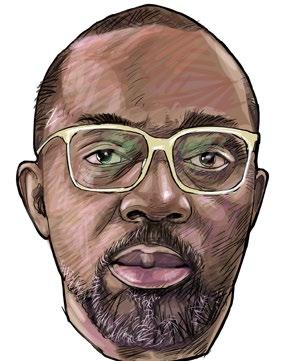

ogannah@thewillnews.com
On March 27, a violent incident shook Uromi, a prominent town in Edo State, when local vigilantes stopped a group of about 16 northern males of Hausa origin being transported inside a truck carrying agricultural produce from Port Harcourt to Kano.
The vigilantes allegedly found Dane guns and large amounts of cash among the group’s possessions, leading to accusations of banditry, criminality and kidnapping. The men, according to eyewitnesses, were hiding inside the agricultural produce when the vigilantes forced the vehicle to pullover. What followed was brutal: Some of the hunters were lynched and their bodies set ablaze. This event has sparked outrage across Nigeria and raised fears of reprisals among northern communities.
Beyond the immediate horror, this incident points to a deeper problem: a growing crisis of public confidence in the country’s institutions. When people believe justice cannot be obtained through legal means, they turn to mob actions, fueling cycles of violence and widening societal divisions.
The Uromi killings did not happen in isolation. Nigeria has faced a rising tide of mob justice in recent years, often tied to public frustration with security and legal systems. In a statement from October 2024, Amnesty International noted that the country has seen an escalation of such violence, with authorities failing to investigate or protect rights effectively. In this case, the hunters were suspected of being ruthless kidnappers that have terrorised the area, but no formal process determined their guilt. Instead, a crowd took matters into its own hands, bypassing police and courts entirely.
Edo State Governor, Monday Okpebholo, quickly condemned the act and ordered the arrest of 14 suspects, yet this response came after the fact. Reactive measures, while necessary, do little to address the underlying issues that lead communities to feel abandoned by those meant to protect them. The absence of proactive steps, such as tackling farmer-herder conflicts or ensuring visible security presence, left Uromi vulnerable to this outbreak of violence.
Leadership failures extend beyond this single event. For years, the Nigerian Government has struggled to manage tensions over land and resources, particularly between farming communities and Fulani/Hausa herders, many of whom come from northern regions. These disputes have claimed countless lives and eroded trust in state authority.
On the other hand, state and federal authorities repeatedly fail to hold security forces accountable for abuses, a pattern that mirrors public perceptions of an ineffective system.
In Uromi, the vigilantes’ actions suggest a belief that official channels would not deliver justice swiftly or fairly. Governor Okpebholo has since pledged to prioritise security, but words alone cannot rebuild faith. The state and indeed, federal authorities must show it can act before crises erupt, not merely respond with arrests and promises afterward. Without such efforts, communities will continue to rely on self-help, deepening the cycle of violence.
The judiciary lies at the heart of this crisis. If people trusted the criminal justice system to punish wrongdoers, mob killings might
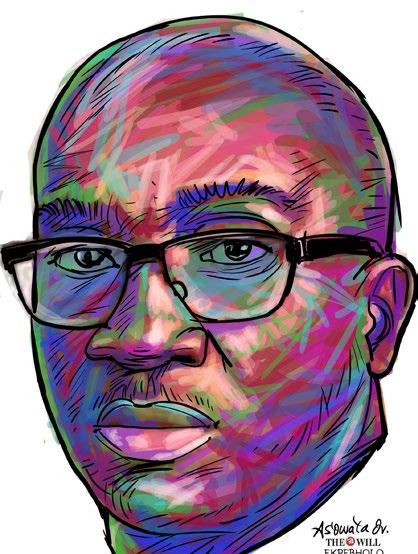
not occur with such frequency. Yet, Nigeria’s courts and prisons face significant challenges. In February 2025, the Chief Justice of Nigeria highlighted concerns over delays, corruption and bias. Cases often drag on for years, while allegations of judicial misconduct undermine public confidence. In August 2024, political parties under the Inter Party Advisory Council called for urgent reforms to ensure timely and fair justice. In the Uromi case, the lack of a functioning criminal justice process left room for vigilante action. Had there been a reliable mechanism to detain, investigate and try the hunters, the outcome might have differed. Instead, the community saw no alternative but to mete out punishment itself.
Reforming the criminal justice system must be a priority to break this pattern. Expediting trials for violent crimes would send a clear message that justice can be swift. Transparency in court proceedings, coupled with stronger anti-corruption measures, could counter perceptions of bias and rebuild trust. These changes are not mere suggestions but necessities.
The fact is that mob justice in Nigeria, more often than not, stems from a corrupt and unproductive justice system, with citizens losing faith in its ability to deliver results. Implementing reforms requires political will and resources, yet the cost of inaction is far higher: a society where lawlessness becomes the norm. Leadership must commit to these changes, showing citizens that the state can handle disputes without bloodshed.
Beyond the judiciary, restoring public trust demands broader governance improvements. Security remains a pressing concern, with many Nigerians feeling unprotected by police forces stretched thin or perceived as unresponsive.
As I have previously said in my previous writings, community-based policing could help, placing officers closer to the people they serve and fostering cooperation rather than fear. Visible improvements, such as regular patrols or rapid response units, would demonstrate that the state takes safety seriously.
Additionally, addressing grievances like those between farmers and herders through policy, perhaps by mediating land use agreements, could prevent tensions from boiling over. The Uromi incident shows what happens when these steps are neglected: a community, feeling isolated, acts outside the law, and the nation pays the price in division and fear.
Ethnic dynamics add another layer to this issue, though they are not the sole cause. The hunters were northerners and their deaths have sparked protests among Fulani/Hausa communities in Uromi, alongside fears of reprisals elsewhere. This reaction highlights a risk of escalating tensions, yet the root lies in governance failure, not ethnic rivalry alone.
When the state fails to mediate disputes or deliver justice, divisions widen. Leadership must focus on unity, ensuring all groups feel heard and protected under the law. Ignoring this risks turning every incident into a trigger for broader conflict, threatening Nigeria’s faltering cohesion.
The human cost of these failures cannot be overstated. Families of the dead in Uromi mourn the hunters, while others live in dread of retaliation. Each act of violence leaves scars, on victims, perpetrators, and a society forced to witness such brutality. Currently, fear has gripped many in the town after the killings, a sentiment that captures the wider anxiety. These are not abstract statistics, but real people caught in a system that has let them down. Leadership must recognise this toll and act to prevent further loss. A more recent example underscores this urgency: on April 2, gunmen attacked five communities in Bokkos Local Government Area of Plateau State, killing at least 10 people and injuring many others. Houses were burned, and several residents remain missing. This assault came just six days after another attack in Ruwi, also in Bokkos, claimed 10 lives during a wakekeep ceremony, bringing the death toll in the area to 20 within a week.
The Chairman of Bokkos Cultural Development Council, Farmasum Fuddang, reported that the attacks began in Mongor, where security forces intervened, only for the gunmen to move to Daffo, Manguna, Hurti, and Tadai, continuing their rampage.
He noted that over 50 villages in Bokkos have been targeted in the past six months, leaving residents fearful and displaced, with farming, a key livelihood, severely disrupted. Again, I reiterate that we must create local government and state police if we are serious about law and order in this country.
Nigeria stands at a critical point. The Uromi killings, alongside the recent violence in Bokkos, serve as stark warnings of what happens when trust in institutions collapses. Allowing these evil acts fester and leaving citizens to fend for themselves in a land where justice is no longer assured is a recipe for anarchy. The choice belongs to those in power, act decisively, or watch the country slide further into disintegration and probable extinction.
The fact is that mob justice in Nigeria, more often than not, stems from a corrupt and unproductive justice system, with citizens losing faith in its ability to deliver results